
This article was originally posted by Natália Marques on her Medium blog on June 4, 2018.
I landed in Cape Verde on June 17th. I’ve been here for a while already, but as someone who has just spent the last four months away from home, I know that the adjustment period to living in a foreign country lasts essentially the entire time you are there.
I’m here as part of an internship with the Center for Research on Women and Families (CIGEF). My internship involves participation in a much larger project of labor inclusion for the young women of the community of Bela Vista, Praia. As an intern, I will be conducting workshops on the topic of women’s empowerment, and gender-based violence, as a way to contribute to the end goal of including the women of Bela Vista in the formal labor force. Luckily, I will not be working alone, I will be partnering with Mira, a student studying English at the University of Cape Verde (UNI-CV). Together, we will be researching gender-based violence and leading these workshops.
Last week, I visited Bela Vista. It does not look radically different from other parts of Praia, apart from a larger prevalence of spontaneous settlement housing. Those who cannot afford regular housing will stake their claim to a plot of land by building a tiny, one-room structure, and then slowly adding on to it as they are able. This type of housing often lacks basics such as running water and bathrooms.
Many members of the community, notably the women, are employed in the informal sector. This means that the women that I pass by every day on my way to CIGEF, selling fruit, candy, or cigarettes on the sidewalk, might be from the community of Bela Vista, and might be the women who I end up working with closely.
Based on what I have learned so far, Bela Vista has been characterized as an underserved community. But there is always so much more to a place than it being “underserved”, and I am eager to learn more about Bela Vista’s people and their celebrations, past-times, diversity, food, apart from only their struggles. I was very glad to visit Bela Vista’s community center last week, where I will be holding the workshops.
That being said, I also do want to focus on the struggles of the people of Bela Vista in a more productive way, as in, are there community leaders that are currently fighting for better conditions for the community? Who are they, and what exactly are they concentrating on?
Especially as I am doing research and leading workshops on the issue of gender-based violence, which from what I hear is a prominent issue in Cape Verde. How to the women of Bela Vista understand gender-based violence as an issue in their lives? How do they understand gender, as it applies to them? Do they see obvious, unchanging biological differences between men and women? Do they see a need for women to be liberated?
I am extremely curious to know how these women conceptualize the world around them, as it relates to issues of gender. And I have started reading critical pedagogy, and an important principle that stood out has been that there are no new ideas that I can introduce as an educator. I am not here to teach these women anything new about their lives, I am not here to tell them that they are oppressed, that they must memorize and regurgitate the latest gender theories that I learned in college. I am here to “lend theoretical coherence to available evidence” (as Theodore Mills Norton states). If a theory is valid, the evidence of it is out there in the world. If the women of Bela Vista are deeply affected by gender-based violence, and this violence is mass violence that has the potential to poison an entire community from within, and the only way this violence can be combated is through a radical feminist understanding of the world, then these women and I can work cooperatively to stitch together the evidence that proves this to be the case. If this cannot be done, then the theories and the teaching methodology have failed in their principal objective: to remain rooted in reality. These theories are on trial here, not the “correctness” of theoretical knowledge of Cape Verdean women.
Therefore I want to be the type of educator that challenges both herself and her students to sift through evidence and reach conclusions together. I don’t want to teach anyone anything really, because I don’t think I know much at this point in my life, and because I am very aware of the implications of a white western woman educating proletarian African women. I am very aware of the choices I must make as someone who has been tasked as an educator within a group of people who will share radically different experiences from myself. Intersectionality theorists such as Crenshaw argue that sexism is not universally experienced by all women. Women who grew up in Bela Vista might have very different ideas of gender, and the role it plays in their community. I must learn from them as much as they must learn from me.
These next few days, I need to challenge myself to continue reading about radical pedagogy, gender & feminist theory, theories around abuse and gender-based violence, as well as how this phenomenon exists in Cape Verde specifically. I need to inform myself so that these workshops are as useful to the women of Bela Vista as possible. I hope that I can commit to writing these posts weekly, so that next week I can return by sharing more research that I have done around the topic of gender-based violence in Cape Verde. I am also challenging myself to write each post in both English and Portuguese, so that I can strengthen my language skills.
P.S. This internship experience is made possible through a collaboration between the Wellesley Centers for Women at Wellesley College and CIGEF, and by funding from the Anchor Point Fellows Program at Wellesley College.
Natália Marques is Political Science major at Wellesley College (Class of 2019) and the second intern participating in the WCW-CIGEF internship program.


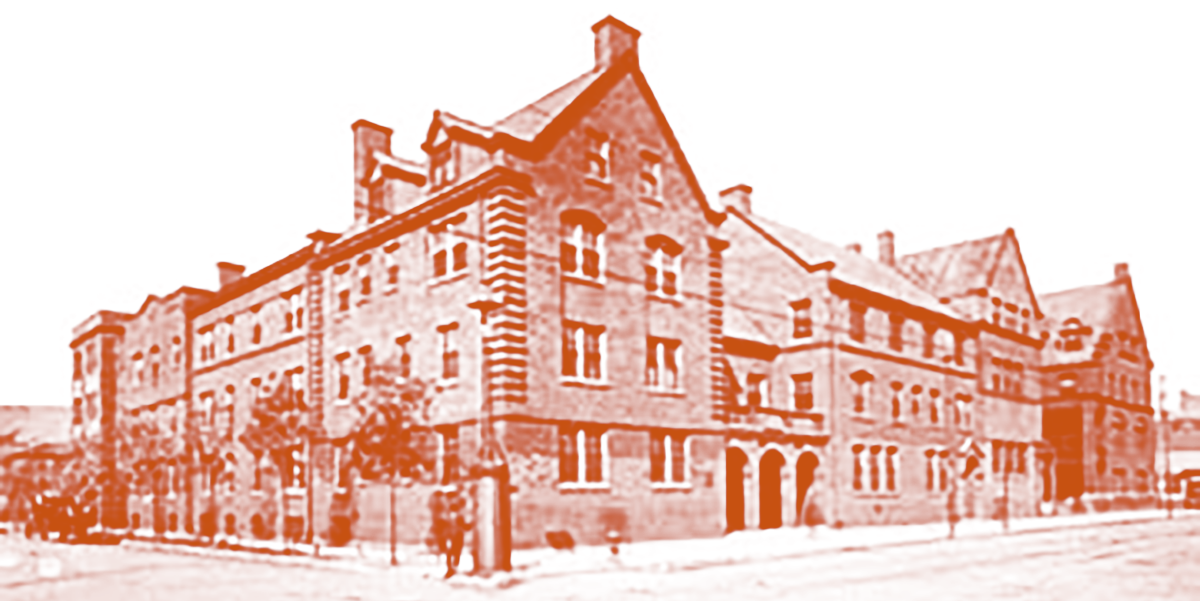 As a country we seem to be moving far away from the nurturing and sustaining activity of the settlement houses of our past. The first settlement house, established in New York City’s Lower East Side – Neighborhood Guild – was founded by Stanton Coit, and just a few years later came Hull House in Chicago, materializing through the passionate vision of Jane Addams. Settlement houses were the cornerstone of communities as they over time took on the task of educating citizens, providing English language classes for immigrants, organizing employment connections, and offering enrichment and recreation opportunities to all in the neighborhood. A most significant beginning to the current child and youth development field, settlement houses provided childcare services for the children of working mothers. The Immigrants’ Protective League, The Juvenile Protective Association, The Institute for Juvenile Research, The Federal Children’s Bureau, along with Child Labor Laws can all trace back to the persistent national
As a country we seem to be moving far away from the nurturing and sustaining activity of the settlement houses of our past. The first settlement house, established in New York City’s Lower East Side – Neighborhood Guild – was founded by Stanton Coit, and just a few years later came Hull House in Chicago, materializing through the passionate vision of Jane Addams. Settlement houses were the cornerstone of communities as they over time took on the task of educating citizens, providing English language classes for immigrants, organizing employment connections, and offering enrichment and recreation opportunities to all in the neighborhood. A most significant beginning to the current child and youth development field, settlement houses provided childcare services for the children of working mothers. The Immigrants’ Protective League, The Juvenile Protective Association, The Institute for Juvenile Research, The Federal Children’s Bureau, along with Child Labor Laws can all trace back to the persistent national 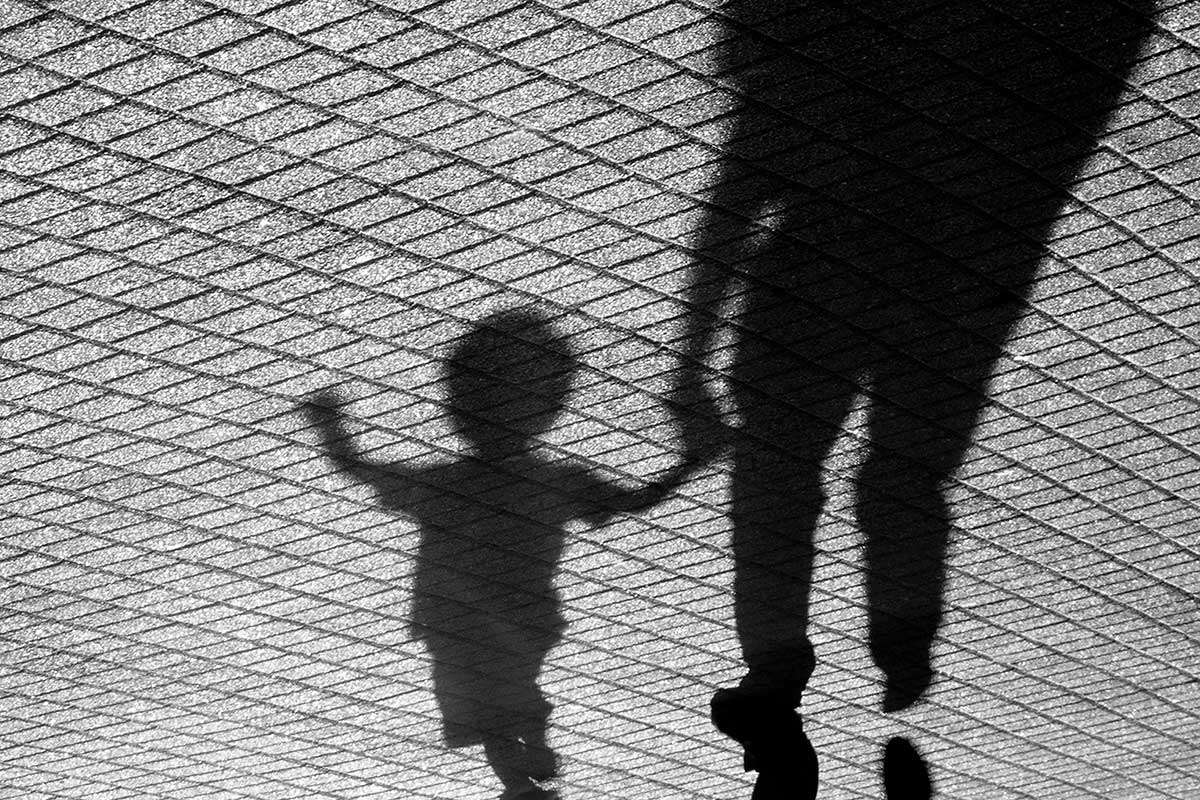 This article was posted by Amy Banks, M.D., on June 19, 2018 in her Wired for Love blog on Psychology Today.
This article was posted by Amy Banks, M.D., on June 19, 2018 in her Wired for Love blog on Psychology Today.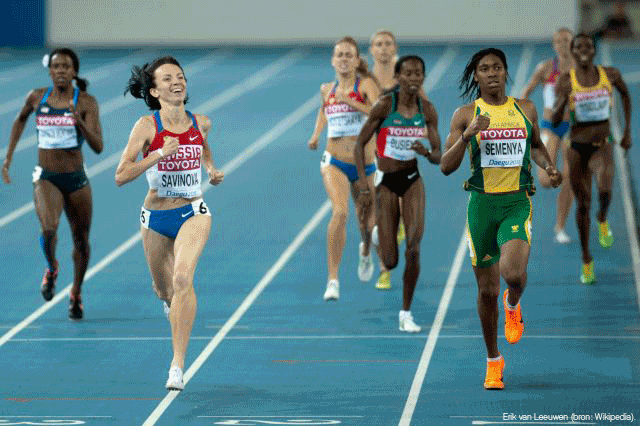 We don’t live in an “either/or” world. Most non-sport institutions get this. It’s why Starbucks has unisex bathrooms, why there are forms to change your gender on government documents, why there is even a concept of “preferred pronouns.”
We don’t live in an “either/or” world. Most non-sport institutions get this. It’s why Starbucks has unisex bathrooms, why there are forms to change your gender on government documents, why there is even a concept of “preferred pronouns.”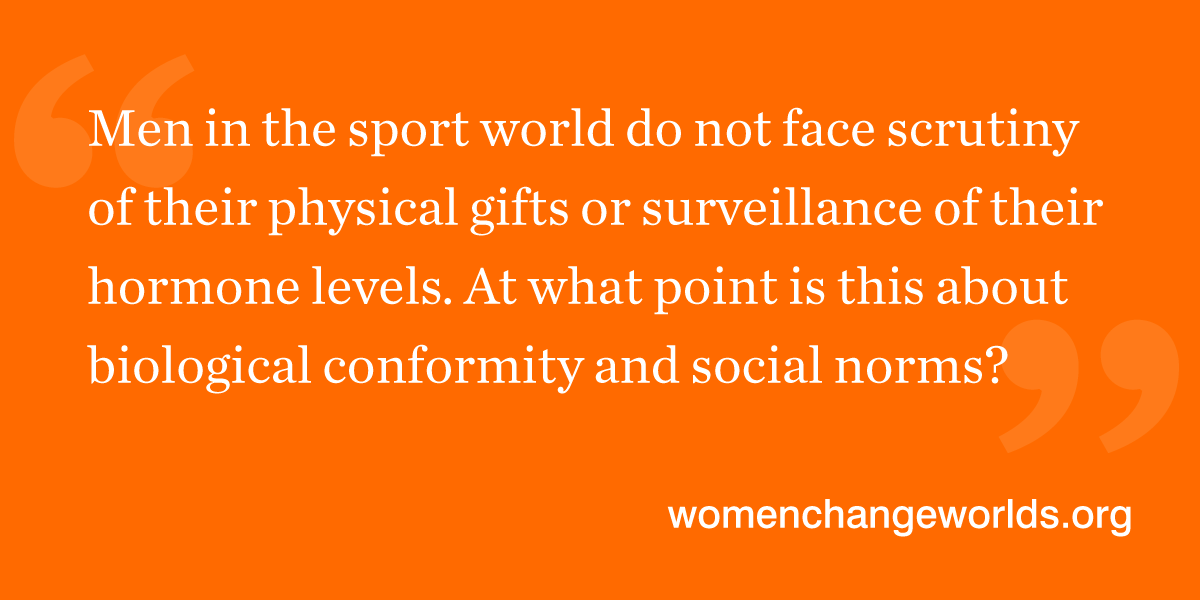 Indian sprinter
Indian sprinter 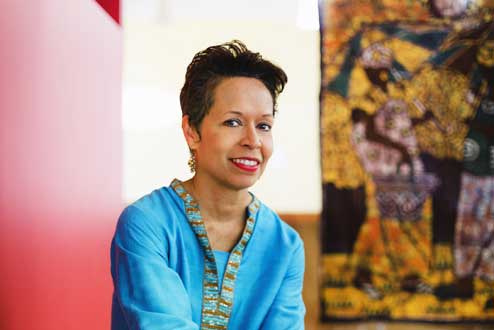 The Wellesley Centers for Women is mourning the death of Deborah Holmes, Chair of the WCW Council of Advisors and a passionate activist committed to the lives of women, people of color, equity, and social justice across the world.
The Wellesley Centers for Women is mourning the death of Deborah Holmes, Chair of the WCW Council of Advisors and a passionate activist committed to the lives of women, people of color, equity, and social justice across the world. A few days ago, my eyes fell upon an online post discussing recent
A few days ago, my eyes fell upon an online post discussing recent 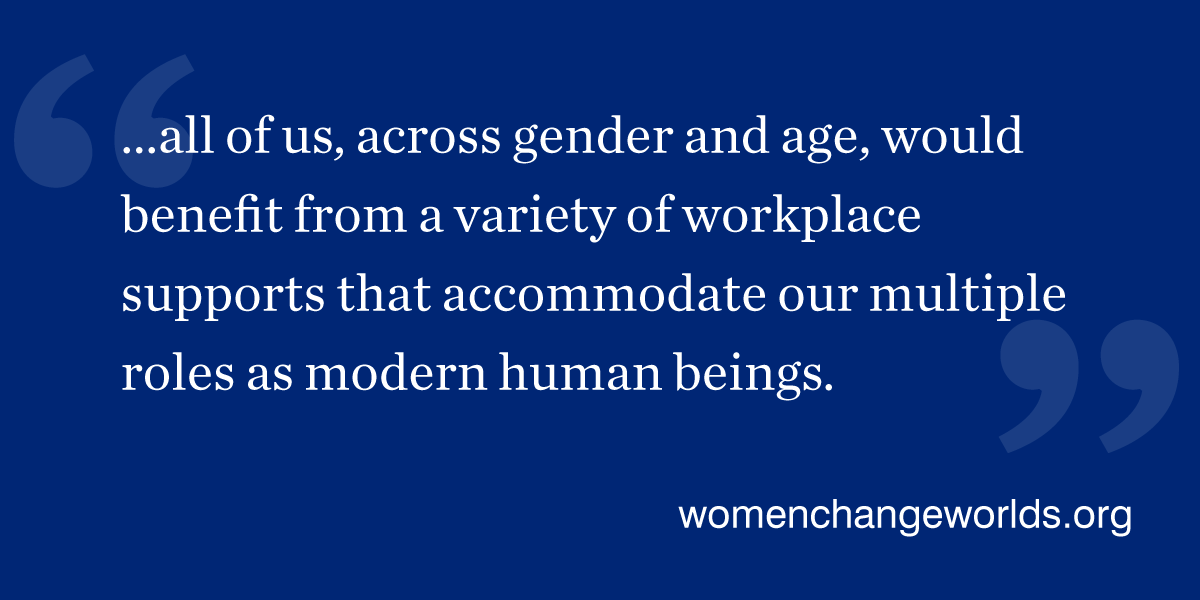 Even in this 21st Century, we have not yet come to accept that parenting is a shared component of our human condition. Every industry employs parents who are trying to balance their work obligations with their family roles. In fact, even non-parents can be called into a caregiving role, for example when their ageing parents need help. Gone are the days when a two-parent family could live on a single paycheck and when family roles were clearly divided. Therefore all of us, across gender and age, would benefit from a variety of workplace supports that accommodate our multiple roles as modern human beings.
Even in this 21st Century, we have not yet come to accept that parenting is a shared component of our human condition. Every industry employs parents who are trying to balance their work obligations with their family roles. In fact, even non-parents can be called into a caregiving role, for example when their ageing parents need help. Gone are the days when a two-parent family could live on a single paycheck and when family roles were clearly divided. Therefore all of us, across gender and age, would benefit from a variety of workplace supports that accommodate our multiple roles as modern human beings.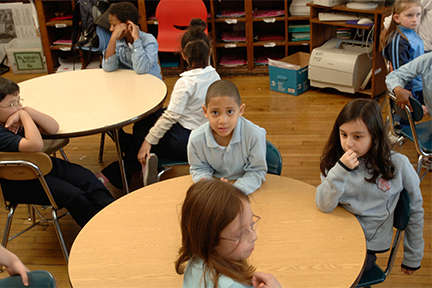 A message from
A message from 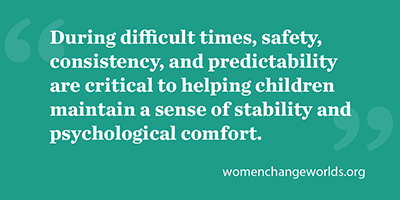 with their own trauma history can be triggered by another traumatic event, even if it did not directly happen to them. In addition to the positive, supportive classroom climate and the social and emotional learning tools that Open Circle provides, some students may need additional time with a school psychologist or guidance counselor to help them manage their fears.
with their own trauma history can be triggered by another traumatic event, even if it did not directly happen to them. In addition to the positive, supportive classroom climate and the social and emotional learning tools that Open Circle provides, some students may need additional time with a school psychologist or guidance counselor to help them manage their fears. As I reflected earlier this month on
As I reflected earlier this month on 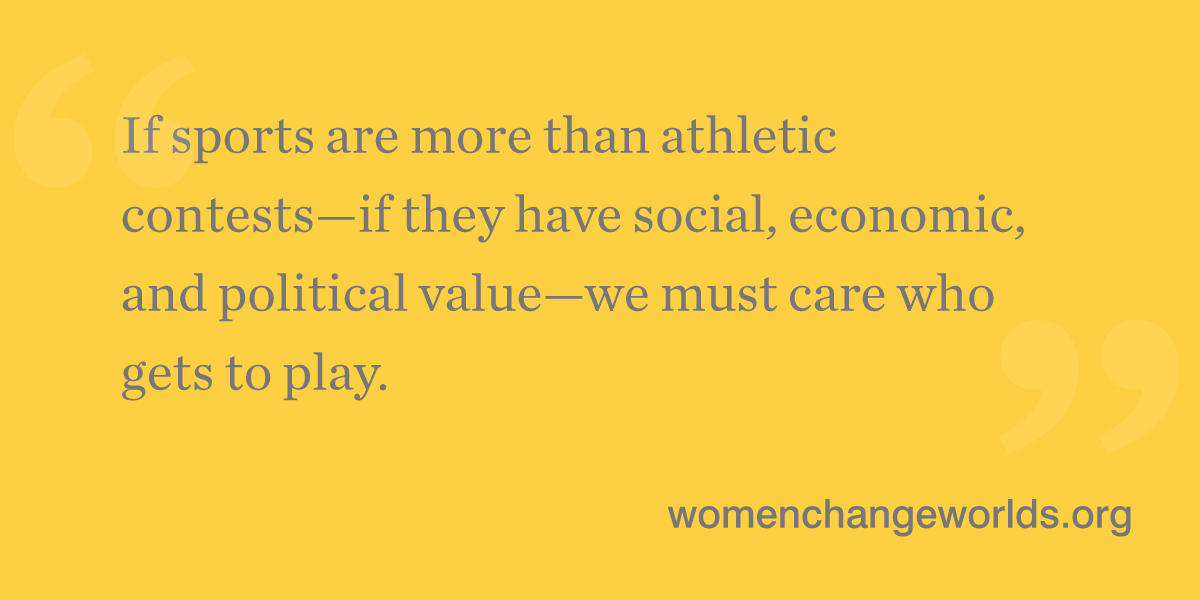 But the very fact that we can clearly delineate “black sports” and “white sports” is not an accident but something nurtured and presumed. If sports are more than athletic contests—if they have social, economic, and political value—we must care who gets to play.
But the very fact that we can clearly delineate “black sports” and “white sports” is not an accident but something nurtured and presumed. If sports are more than athletic contests—if they have social, economic, and political value—we must care who gets to play.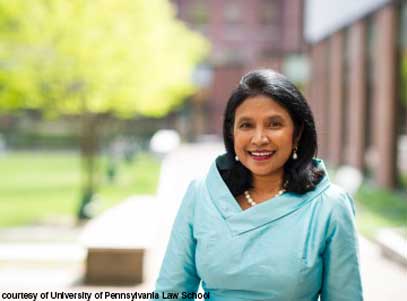 As the 62nd Session of the Commission on the Status of Women (CSW) at the United Nations in New York draws near, women from every corner of the world will convene to deliberate on the theme of CSW 2018: Challenges and Opportunities in achieving gender equality and the empowerment of rural women and girls. This year, the theme of empowerment has added significance. The #MeToo movement has shocked our collective conscience and made it impossible to ignore that empowerment goes far beyond economic agency.
As the 62nd Session of the Commission on the Status of Women (CSW) at the United Nations in New York draws near, women from every corner of the world will convene to deliberate on the theme of CSW 2018: Challenges and Opportunities in achieving gender equality and the empowerment of rural women and girls. This year, the theme of empowerment has added significance. The #MeToo movement has shocked our collective conscience and made it impossible to ignore that empowerment goes far beyond economic agency.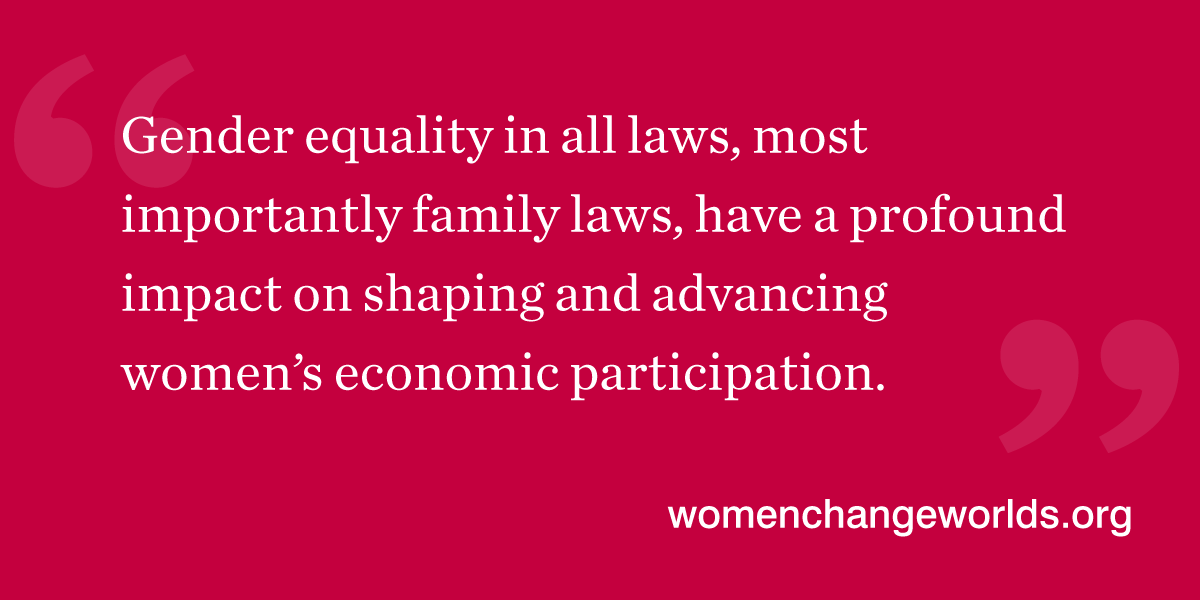 Several countries, notably Japan, have put forward “win-win” economic policies, but they ignore controversial and difficult social policies such as violence against women. This approach is similar to the nations that peddled the “Asian Values” theory in the 1990s. The better approach is to reveal the interconnectedness of women’s economic participation with equal protection of laws.
Several countries, notably Japan, have put forward “win-win” economic policies, but they ignore controversial and difficult social policies such as violence against women. This approach is similar to the nations that peddled the “Asian Values” theory in the 1990s. The better approach is to reveal the interconnectedness of women’s economic participation with equal protection of laws.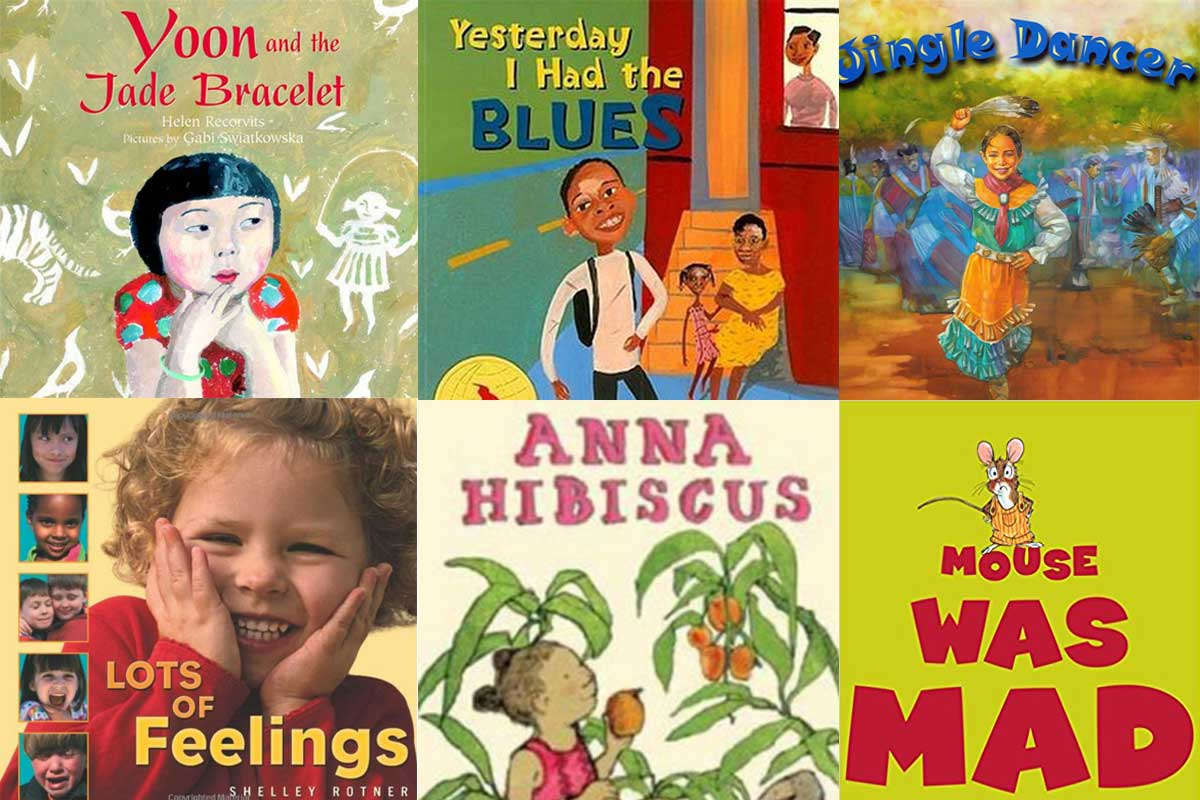 The fifth-grader’s voice was full of emotion as he shouted, “That’s not fair! What a mean thing to do!”
The fifth-grader’s voice was full of emotion as he shouted, “That’s not fair! What a mean thing to do!”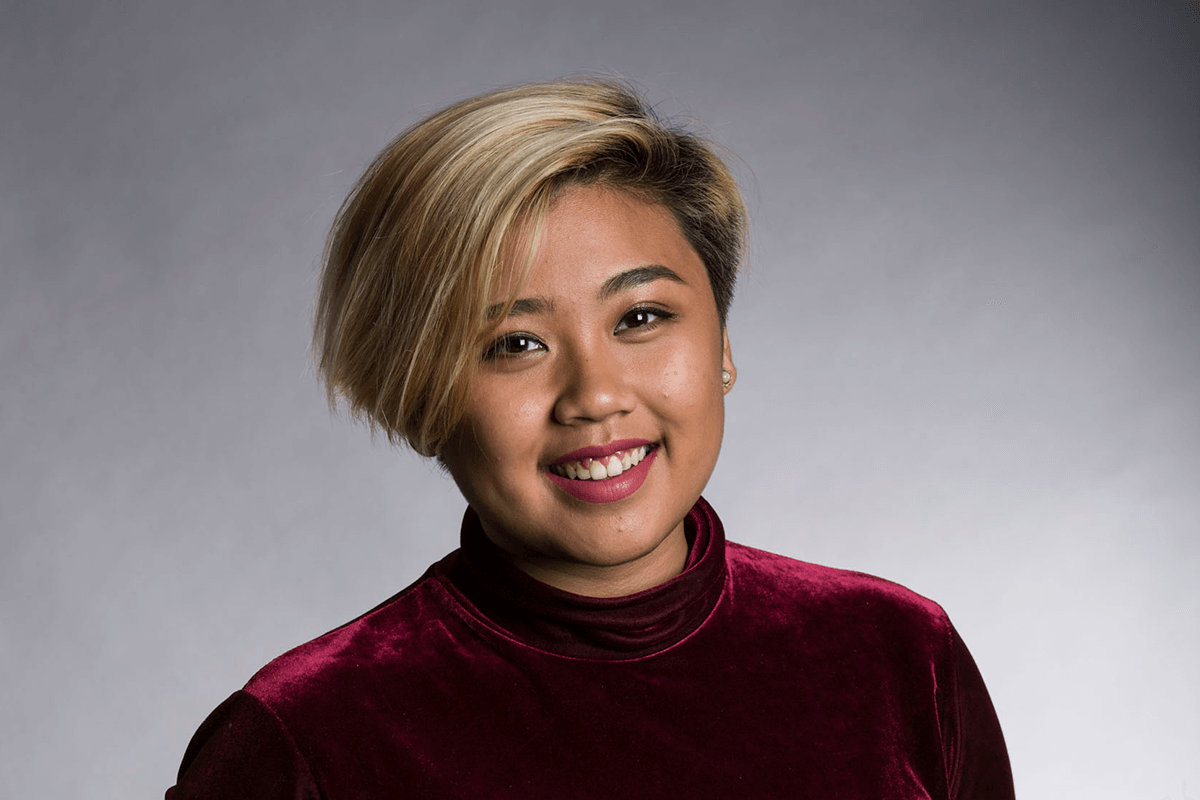 By the end of my first year at Wellesley College, I knew that I wanted to explore the world of research. I had taken the first of many gender studies courses to come, and left class with a head full of questions that I not only wanted answers to, but wanted to take a stake at answering. A stroke of luck brought me to an event for students to meet with research scientists at the Wellesley Center for Women. A stroke of better luck brought me to Dr.
By the end of my first year at Wellesley College, I knew that I wanted to explore the world of research. I had taken the first of many gender studies courses to come, and left class with a head full of questions that I not only wanted answers to, but wanted to take a stake at answering. A stroke of luck brought me to an event for students to meet with research scientists at the Wellesley Center for Women. A stroke of better luck brought me to Dr. 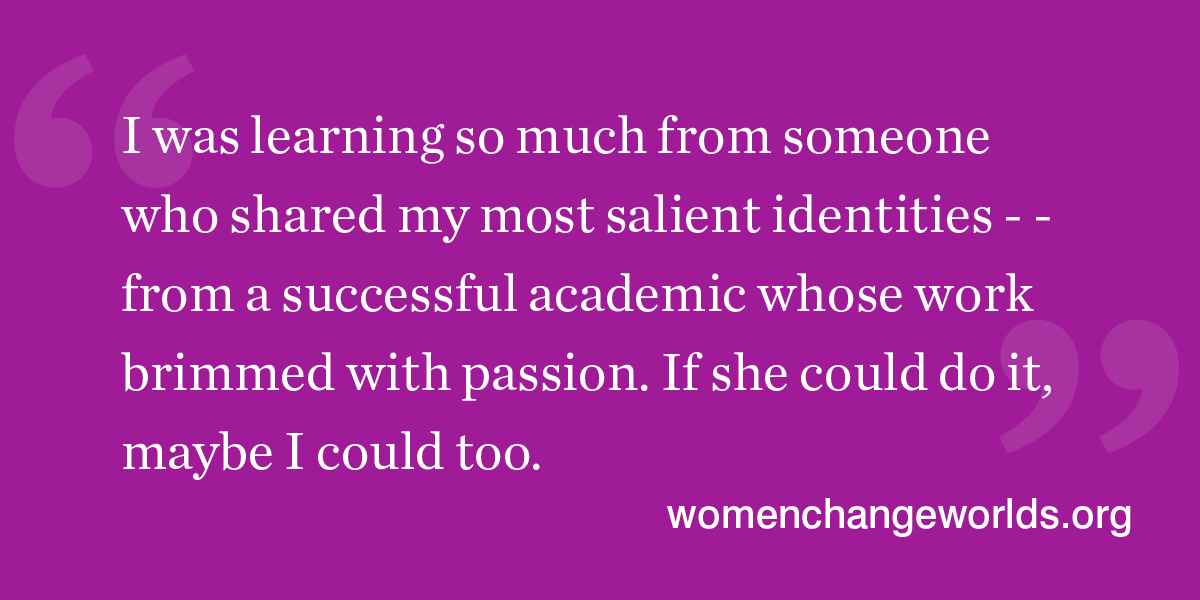 The power of representation became personal when I began to cultivate a mentor-mentee relationship with Linda. Our weekly/bi-weekly research check-ins were not only crucial for the advancement of the qualitative research we were conducting and my own research skills, but also for developing my own sense of worth and potential. Little by little, I was able to learn about Linda’s life and experiences, research and otherwise. I found out she was Thai (like me)! I found out that she also struggled in her undergraduate years (who knew that researchers were not perfect?). She spoke about her queerness in ways that normalized my own burgeoning questions about sexuality and gender. She validated my questions, hopes, and fears no matter how naive, incomplete, or overwhelming. I was learning so much from someone who shared my most salient identities - - from a successful academic whose work brimmed with passion. If she could do it, maybe I could too.
The power of representation became personal when I began to cultivate a mentor-mentee relationship with Linda. Our weekly/bi-weekly research check-ins were not only crucial for the advancement of the qualitative research we were conducting and my own research skills, but also for developing my own sense of worth and potential. Little by little, I was able to learn about Linda’s life and experiences, research and otherwise. I found out she was Thai (like me)! I found out that she also struggled in her undergraduate years (who knew that researchers were not perfect?). She spoke about her queerness in ways that normalized my own burgeoning questions about sexuality and gender. She validated my questions, hopes, and fears no matter how naive, incomplete, or overwhelming. I was learning so much from someone who shared my most salient identities - - from a successful academic whose work brimmed with passion. If she could do it, maybe I could too. The #MeToo movement is giving a viral voice to women (and men) who have been the targets of violence and harassment. It is a social change campaign that I never thought would happen in my lifetime. Honestly, when it first started to spread on
The #MeToo movement is giving a viral voice to women (and men) who have been the targets of violence and harassment. It is a social change campaign that I never thought would happen in my lifetime. Honestly, when it first started to spread on 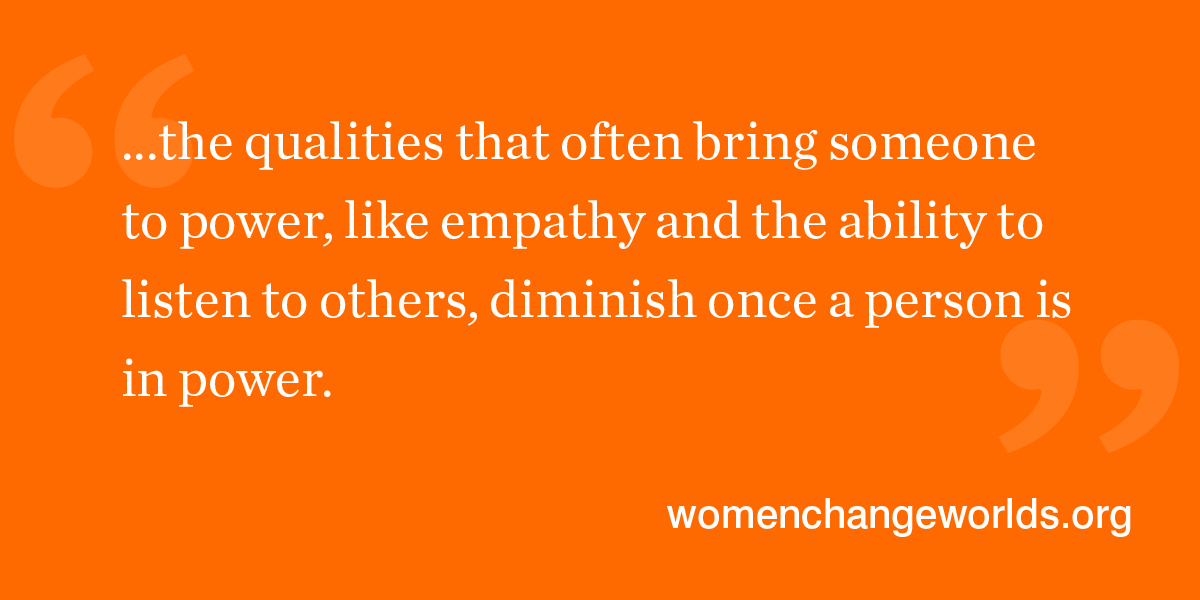 For those too busy to watch the five-minute video, here is a summary of the study. The researchers brought three individuals to the social science lab and told one of them that they were in charge—essentially giving that person power over the other two. While the group was busy with the assigned task of writing boring university policy, the researchers brought out a plate of four cookies. Initially, each of the three participants ate one cookie each, leaving one on the plate. Interestingly, most of the time, the person given the power eventually ate the fourth cookie. In Dr. Keltner's study taking the fourth cookie correlated with having power and also with a decrease in activity of the mirror neuron system (the circuits in your brain that produce empathy and allow appreciation of the impact of your actions on others). Further, as the researchers watched the behavior of those given power, they observed that the people in charge ate differently. They chewed with their mouths open and occasionally had little pieces of food dropping out of their mouths. Dr. Keltner describes this change in the level of interpersonal awareness as the "paradox of power"—the qualities that often bring someone to power, like empathy and the ability to listen to others, diminish once a person is in power.
For those too busy to watch the five-minute video, here is a summary of the study. The researchers brought three individuals to the social science lab and told one of them that they were in charge—essentially giving that person power over the other two. While the group was busy with the assigned task of writing boring university policy, the researchers brought out a plate of four cookies. Initially, each of the three participants ate one cookie each, leaving one on the plate. Interestingly, most of the time, the person given the power eventually ate the fourth cookie. In Dr. Keltner's study taking the fourth cookie correlated with having power and also with a decrease in activity of the mirror neuron system (the circuits in your brain that produce empathy and allow appreciation of the impact of your actions on others). Further, as the researchers watched the behavior of those given power, they observed that the people in charge ate differently. They chewed with their mouths open and occasionally had little pieces of food dropping out of their mouths. Dr. Keltner describes this change in the level of interpersonal awareness as the "paradox of power"—the qualities that often bring someone to power, like empathy and the ability to listen to others, diminish once a person is in power.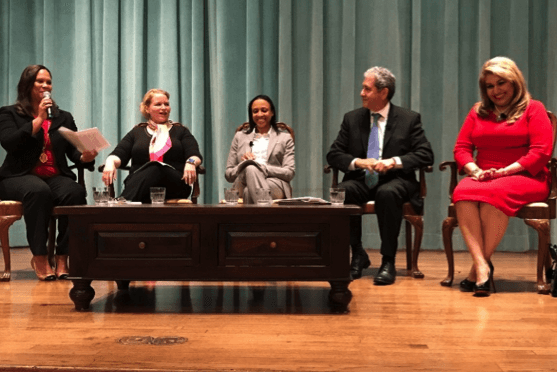 As we enter 2018 with eager anticipation, it is a natural part of the transition into the new year to establish personal and career resolutions. Many business leaders consider ways to refresh the strategy for their organizations seeking to answer questions such as “How can my team help our organization achieve its goals with a greater impact?”
As we enter 2018 with eager anticipation, it is a natural part of the transition into the new year to establish personal and career resolutions. Many business leaders consider ways to refresh the strategy for their organizations seeking to answer questions such as “How can my team help our organization achieve its goals with a greater impact?”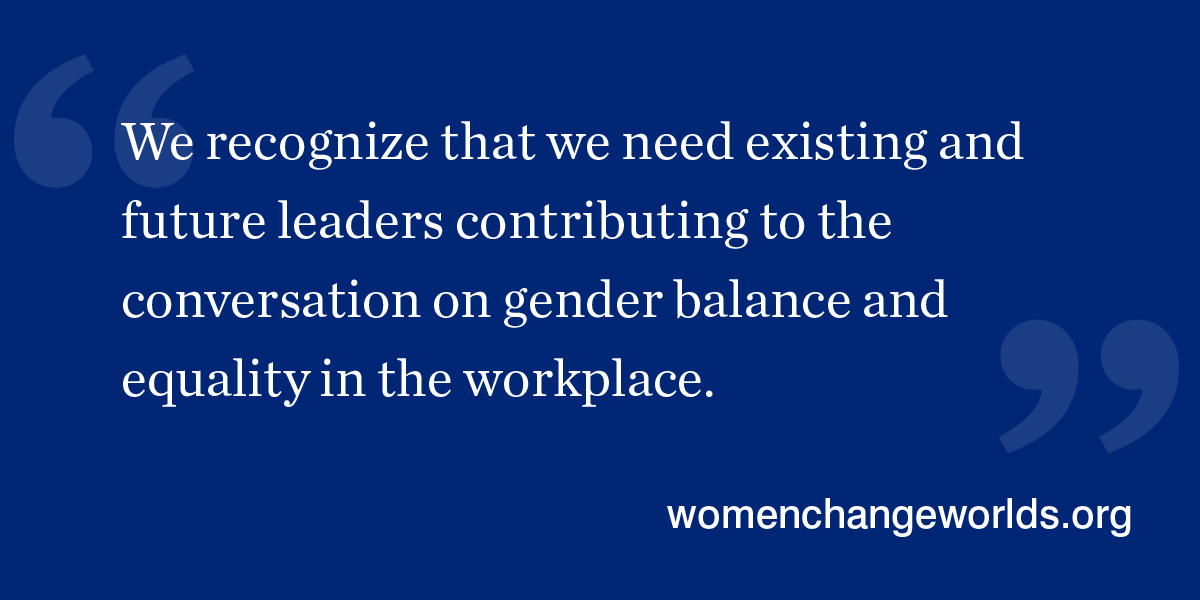
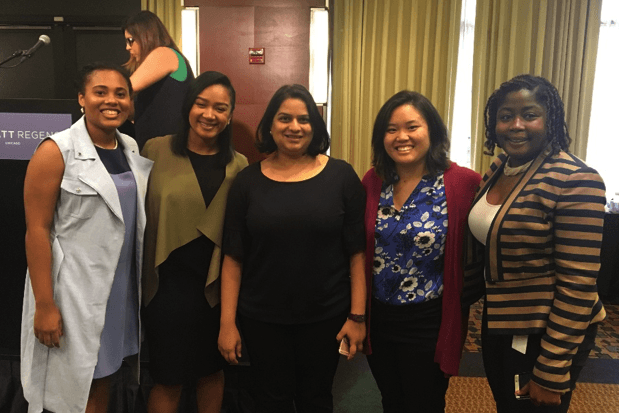 Finally, Capgemini enhanced our Women’s Leadership Development Program (WLDP) to ensure a positive impact on the development of our women leaders. As a three-month program designed to provide training, mentoring, career objective-setting, and coaching for women in North America, WLDP is a signature program of the company’s talent development initiatives.
Finally, Capgemini enhanced our Women’s Leadership Development Program (WLDP) to ensure a positive impact on the development of our women leaders. As a three-month program designed to provide training, mentoring, career objective-setting, and coaching for women in North America, WLDP is a signature program of the company’s talent development initiatives.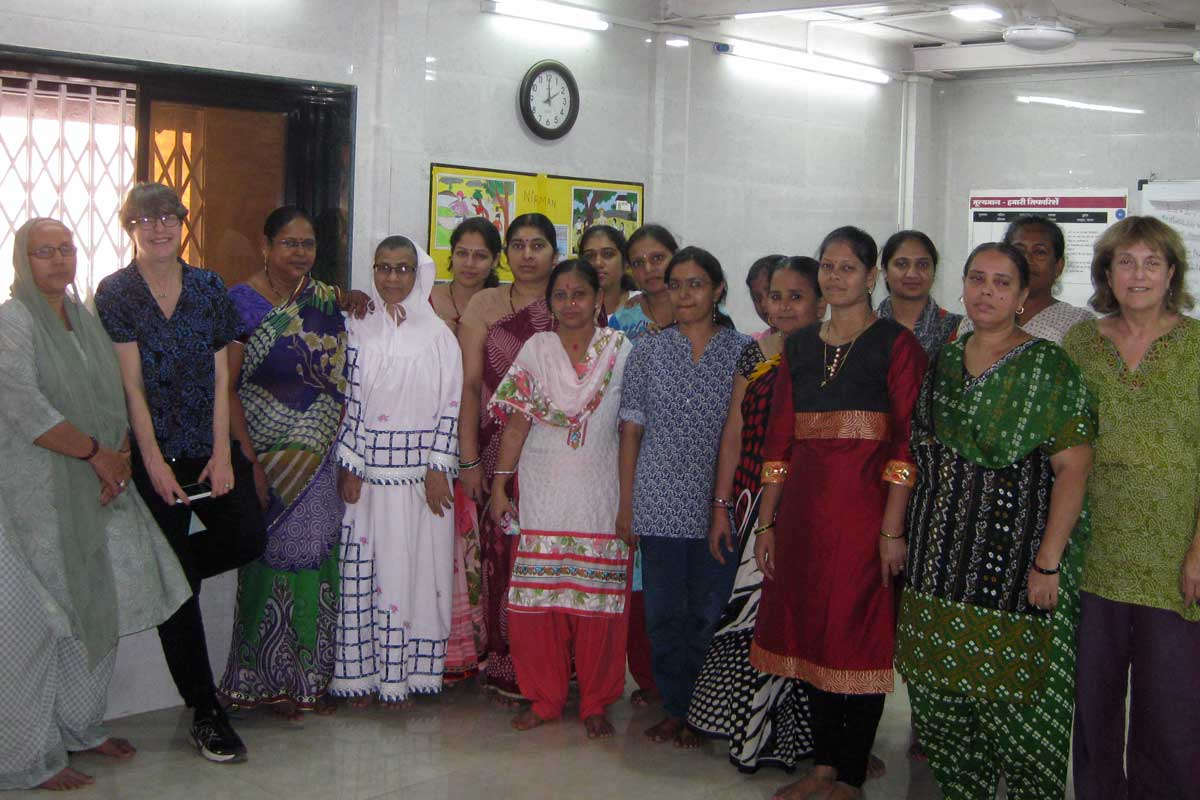 I have been a fan of
I have been a fan of 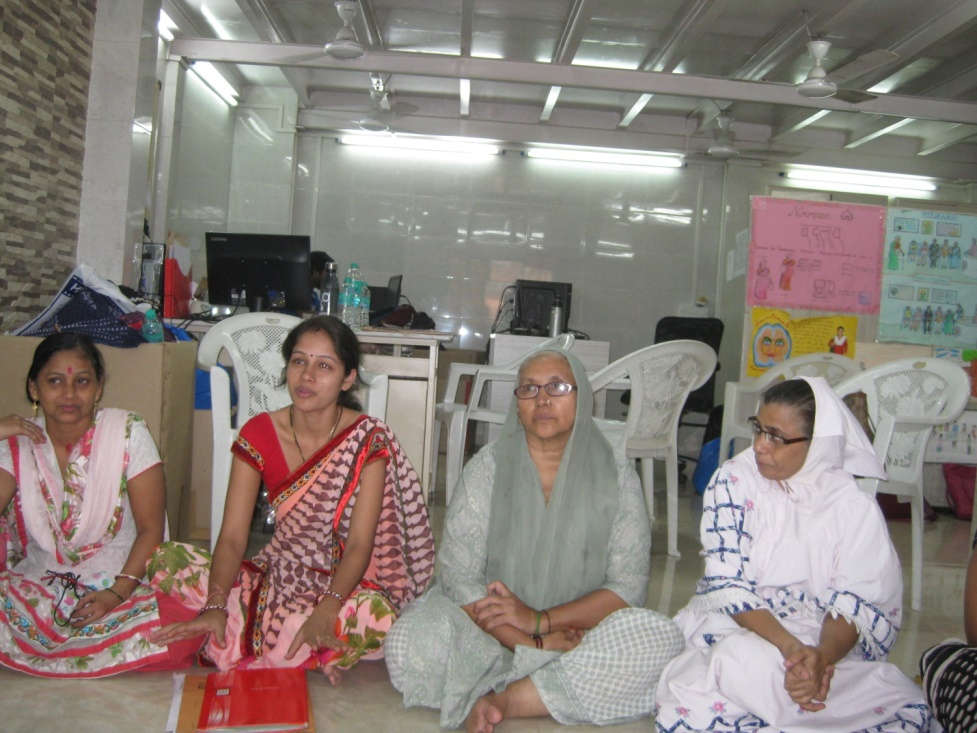 With our cell phones actively participating in locating the office, along with the skills of our car service driver, we arrived after lunch on November 14, 2017. About 12 women artisans were gathered together along with some staff -- they greeted us with a special handmade mandala on the floor, and after a candle lighting ceremony, they sang us a song that they had written.
With our cell phones actively participating in locating the office, along with the skills of our car service driver, we arrived after lunch on November 14, 2017. About 12 women artisans were gathered together along with some staff -- they greeted us with a special handmade mandala on the floor, and after a candle lighting ceremony, they sang us a song that they had written.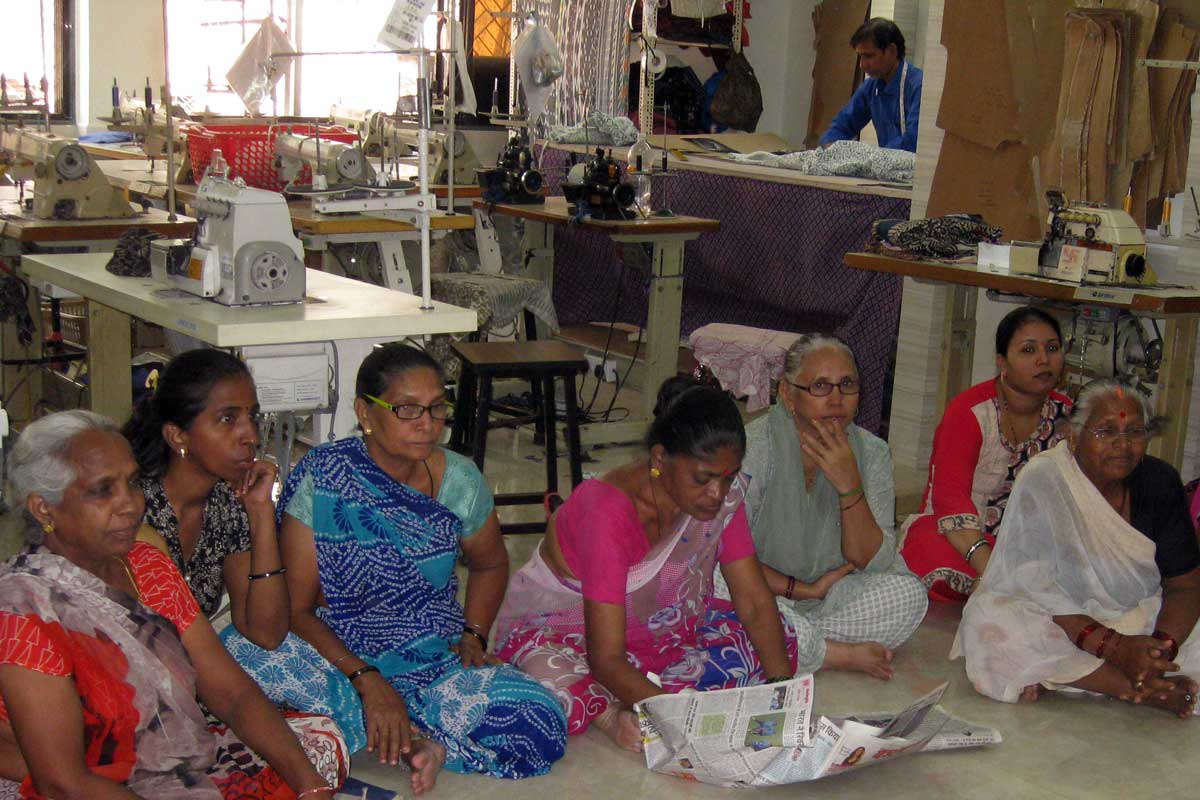
 We all have heard it, women earn about 20 percent less than men. But when, how, and why does the gap emerge? Everyone has an opinion on it, and these opinions range widely – which leads to many
We all have heard it, women earn about 20 percent less than men. But when, how, and why does the gap emerge? Everyone has an opinion on it, and these opinions range widely – which leads to many 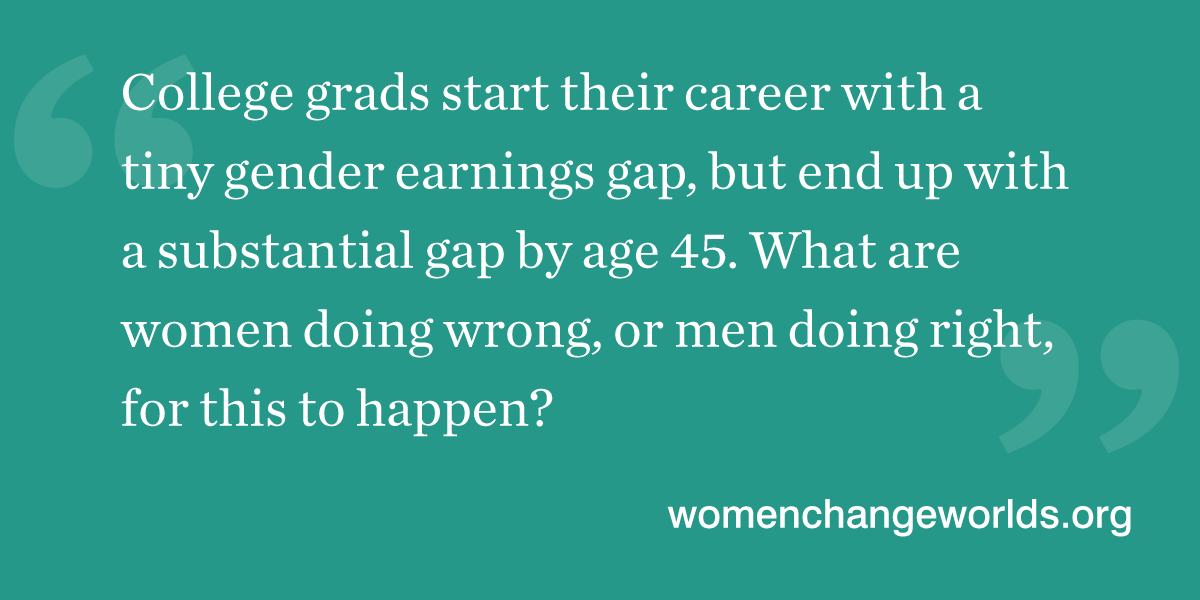 Another expensive “choice” women make is motherhood. Women are more likely to
Another expensive “choice” women make is motherhood. Women are more likely to  In a meeting with the Congressional Black Caucus earlier in October, Facebook’s Chief Operating Officer,
In a meeting with the Congressional Black Caucus earlier in October, Facebook’s Chief Operating Officer, 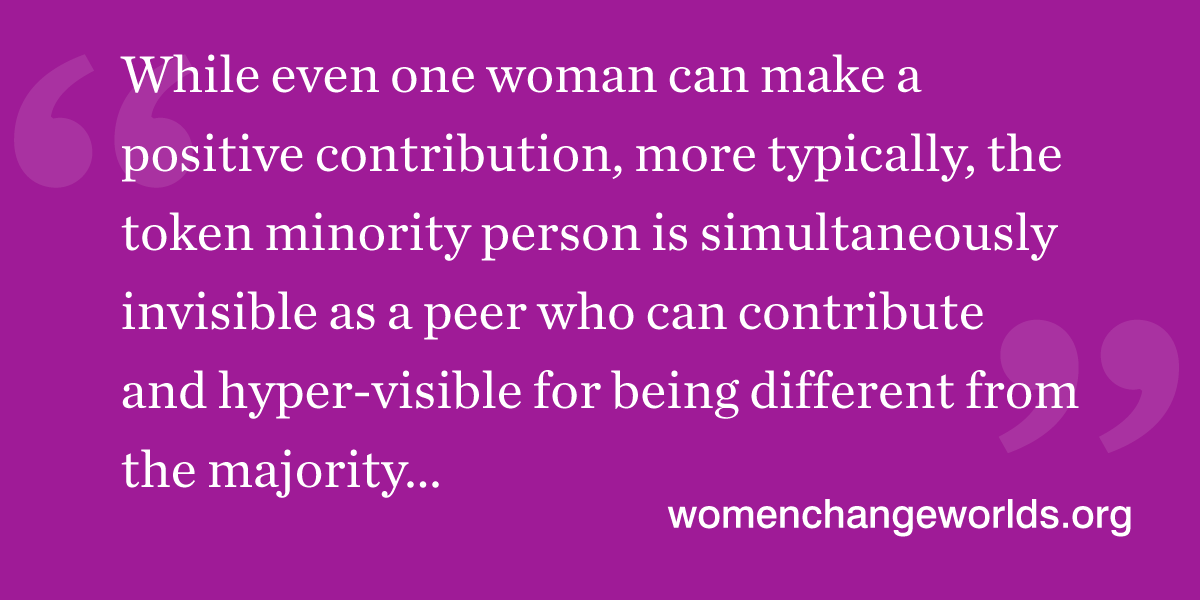 My colleagues Vicki Kramer, Allison Konrad, and I interviewed 50 women directors, 12 CEOs (nine male), and seven corporate secretaries at Fortune 1000 companies. We found that
My colleagues Vicki Kramer, Allison Konrad, and I interviewed 50 women directors, 12 CEOs (nine male), and seven corporate secretaries at Fortune 1000 companies. We found that 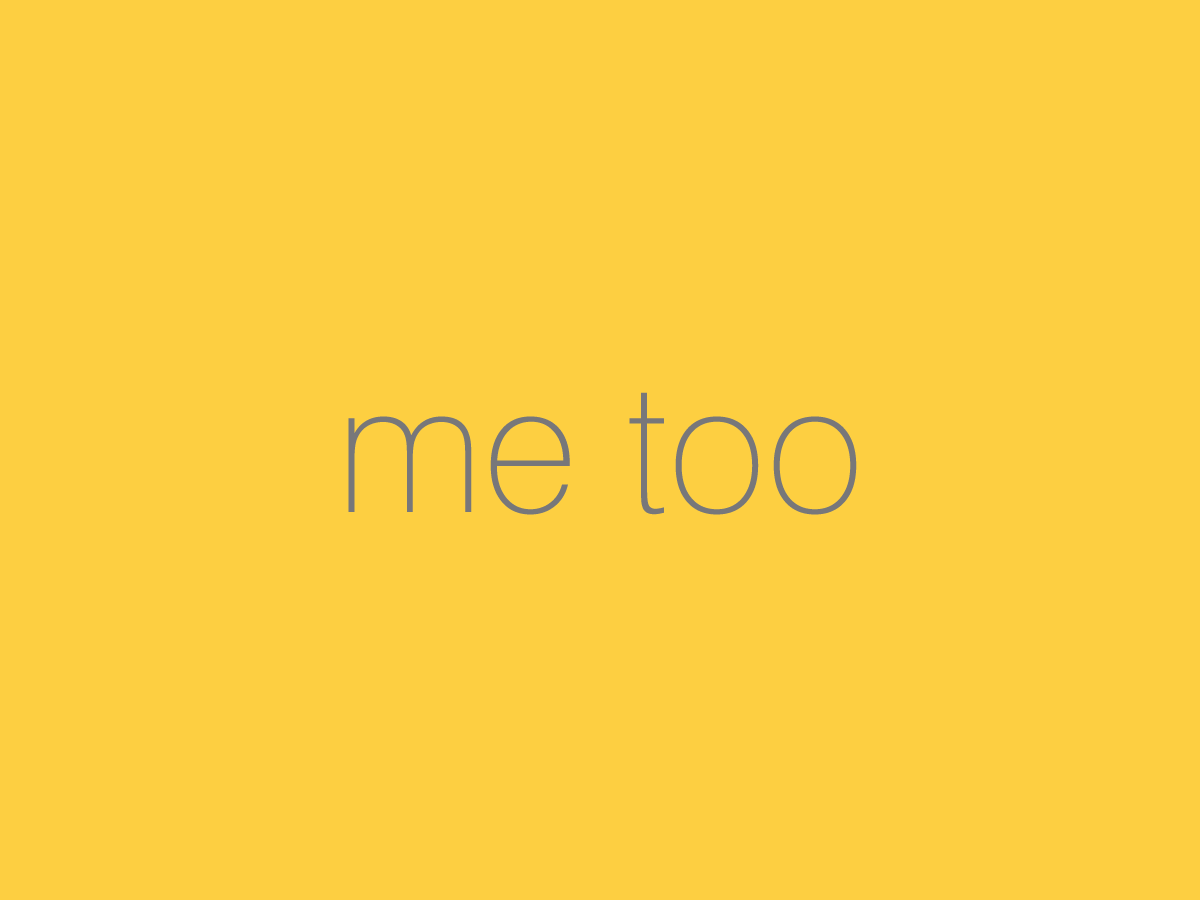 I applaud the strength and solidarity of the women (and men, too) who are asserting with the hashtag
I applaud the strength and solidarity of the women (and men, too) who are asserting with the hashtag 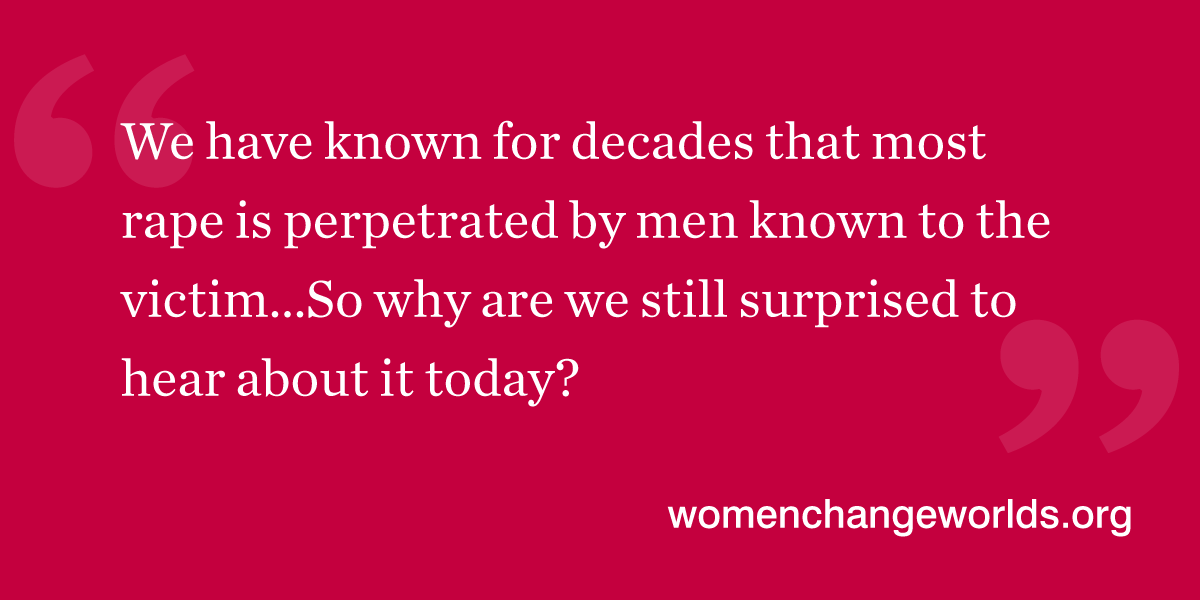 We must remember it is not only Hollywood producers who sexually assault and not only young actors who are the victims. The rapists and perpetrators of sexual assault include:
We must remember it is not only Hollywood producers who sexually assault and not only young actors who are the victims. The rapists and perpetrators of sexual assault include: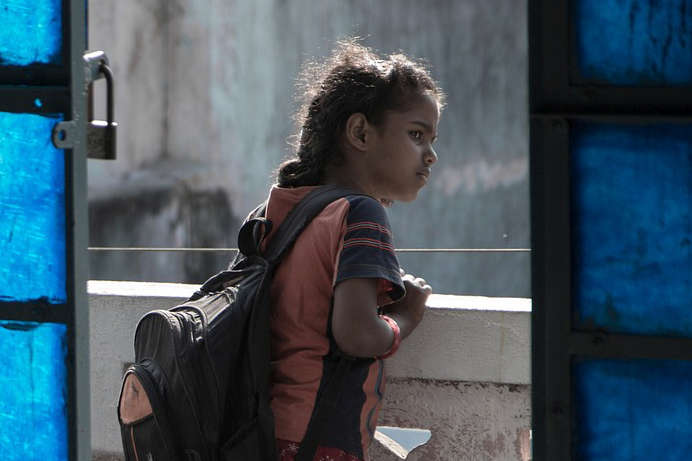 The Supreme Court of India
The Supreme Court of India 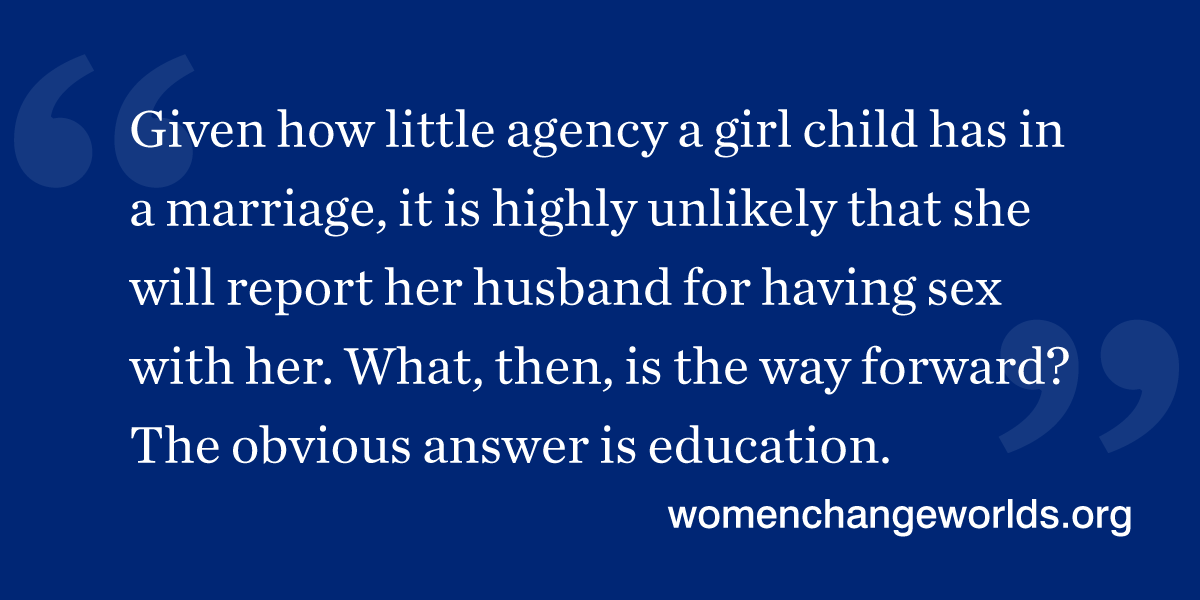 It is common knowledge that there is a link between lower levels of education and early marriage. The
It is common knowledge that there is a link between lower levels of education and early marriage. The  Nandita Dutta is deputy manager at the
Nandita Dutta is deputy manager at the 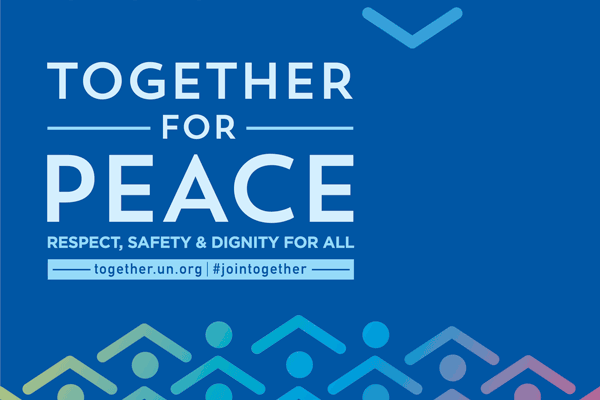 Since 1981, the United Nations has observed International Day of Peace on September 21. In its resolution, the UN marked the day as a “
Since 1981, the United Nations has observed International Day of Peace on September 21. In its resolution, the UN marked the day as a “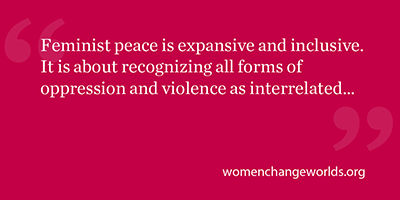 WILPF has been one of many women’s peace organizations who successfully lobbied the UN Security Council to recognize, in Resolution 1325 (
WILPF has been one of many women’s peace organizations who successfully lobbied the UN Security Council to recognize, in Resolution 1325 ( It’s back-to-school time and families, youth, and educators must adjust their schedules for another school year. In the midst of the forms and information families receive – or that get “lost” in a child’s backpack or locker – you may have heard something about a
It’s back-to-school time and families, youth, and educators must adjust their schedules for another school year. In the midst of the forms and information families receive – or that get “lost” in a child’s backpack or locker – you may have heard something about a 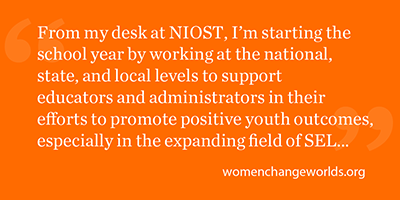 From my desk at NIOST, I’m starting the school year by working at the national, state, and local levels to support educators and administrators in their efforts to promote positive youth outcomes, especially in the expanding field of SEL. Specifically, I am researching the SEL programs that states are currently adopting in preparation for our forthcoming workshop for out-of-school time (OST) leaders on how to integrate these practices into school-age child care or other OST settings. As I do this work, my background as a former school committee member and education advocate means I can’t resist passing along the newest SEL information that comes across my desk to the regional school administrators in my community who are convening the SEL planning discussions for local schools.
From my desk at NIOST, I’m starting the school year by working at the national, state, and local levels to support educators and administrators in their efforts to promote positive youth outcomes, especially in the expanding field of SEL. Specifically, I am researching the SEL programs that states are currently adopting in preparation for our forthcoming workshop for out-of-school time (OST) leaders on how to integrate these practices into school-age child care or other OST settings. As I do this work, my background as a former school committee member and education advocate means I can’t resist passing along the newest SEL information that comes across my desk to the regional school administrators in my community who are convening the SEL planning discussions for local schools.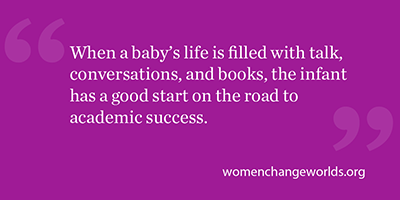 Friday, September 8, is
Friday, September 8, is  and sharing books begins at birth. Try to read aloud to your baby every day! With the very young infant you may look at only one page of a book- in time, you can look together at two or more. Turning the pages, labeling pictures and describing what is happening on the page all lead to vocabulary and grammar development. Reading to your baby also predicts their early reading and writing skills! Cuddling together to read and share books is a very pleasant experience for both the infant and you! These very early enjoyable experiences can lead to a life-long love of reading. When there are plenty of books available, an infant may even try to look at the pictures in books on her/his own. And, remember your local library is a good source of books for your infant.
and sharing books begins at birth. Try to read aloud to your baby every day! With the very young infant you may look at only one page of a book- in time, you can look together at two or more. Turning the pages, labeling pictures and describing what is happening on the page all lead to vocabulary and grammar development. Reading to your baby also predicts their early reading and writing skills! Cuddling together to read and share books is a very pleasant experience for both the infant and you! These very early enjoyable experiences can lead to a life-long love of reading. When there are plenty of books available, an infant may even try to look at the pictures in books on her/his own. And, remember your local library is a good source of books for your infant.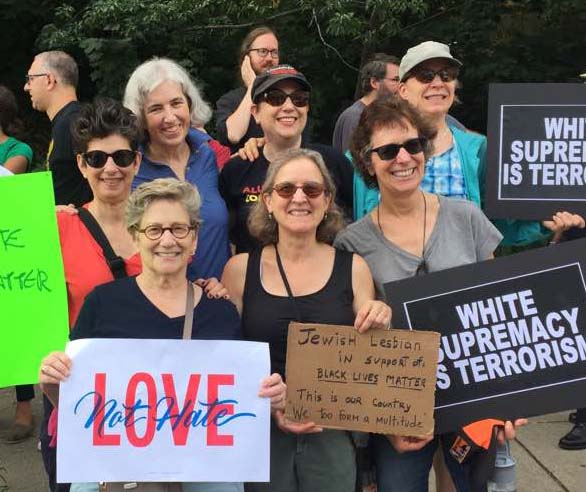
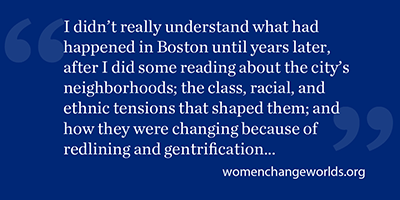 How did this turnaround happen? I’m glad of it, but I don’t know. Some of the people I talked to theorized about a better-educated population, a two-term black president, more understanding and acceptance of LGBTQ people and other nonmainstream folk—and even the experience of the 1970s, from which at least some white people in Boston concluded that the anger, fear, and hatred that they directed toward people of color caused only misery and destruction—not only to others but even to themselves.
How did this turnaround happen? I’m glad of it, but I don’t know. Some of the people I talked to theorized about a better-educated population, a two-term black president, more understanding and acceptance of LGBTQ people and other nonmainstream folk—and even the experience of the 1970s, from which at least some white people in Boston concluded that the anger, fear, and hatred that they directed toward people of color caused only misery and destruction—not only to others but even to themselves.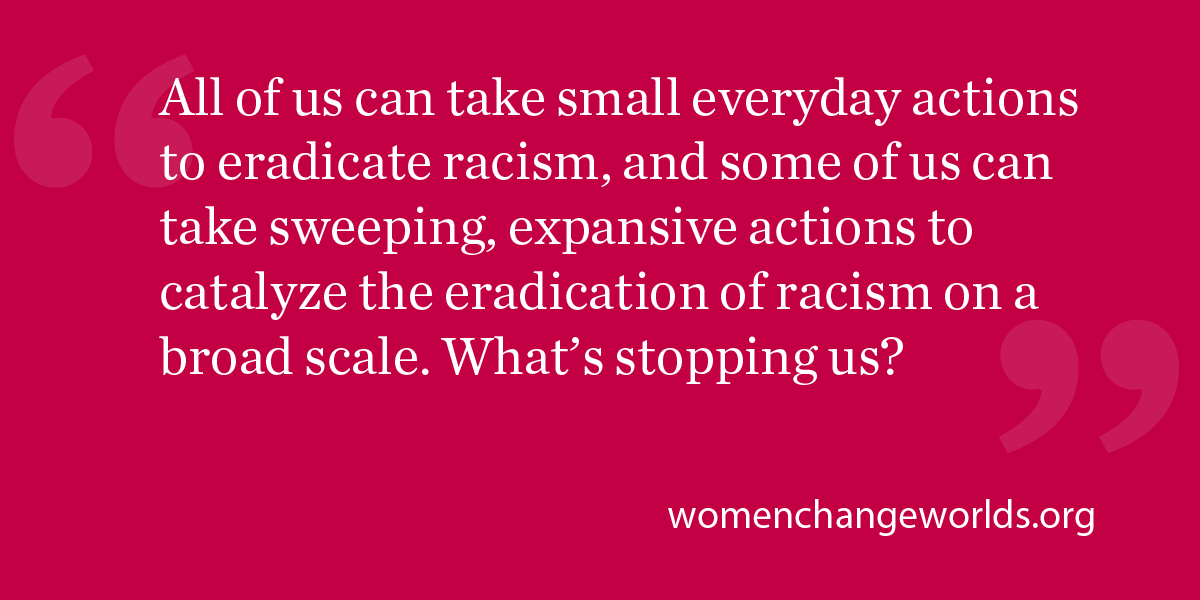
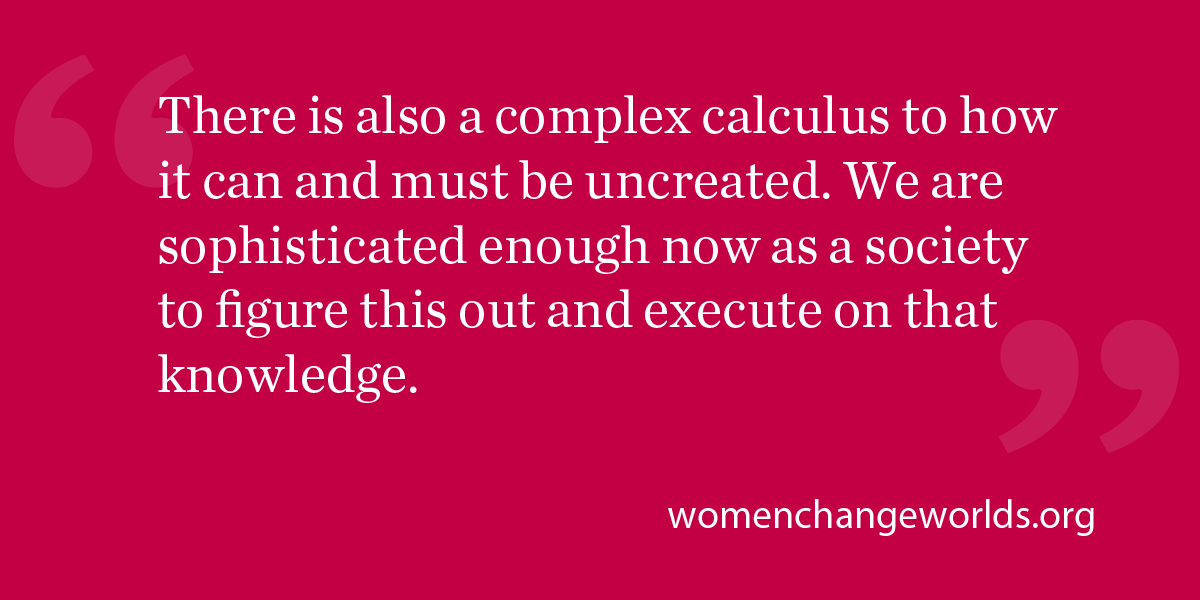 As a developmental psychologist who works from an
As a developmental psychologist who works from an 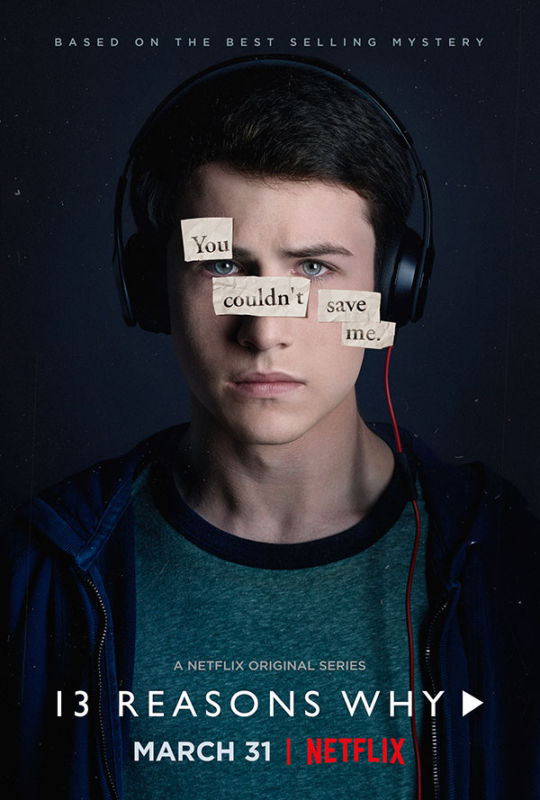
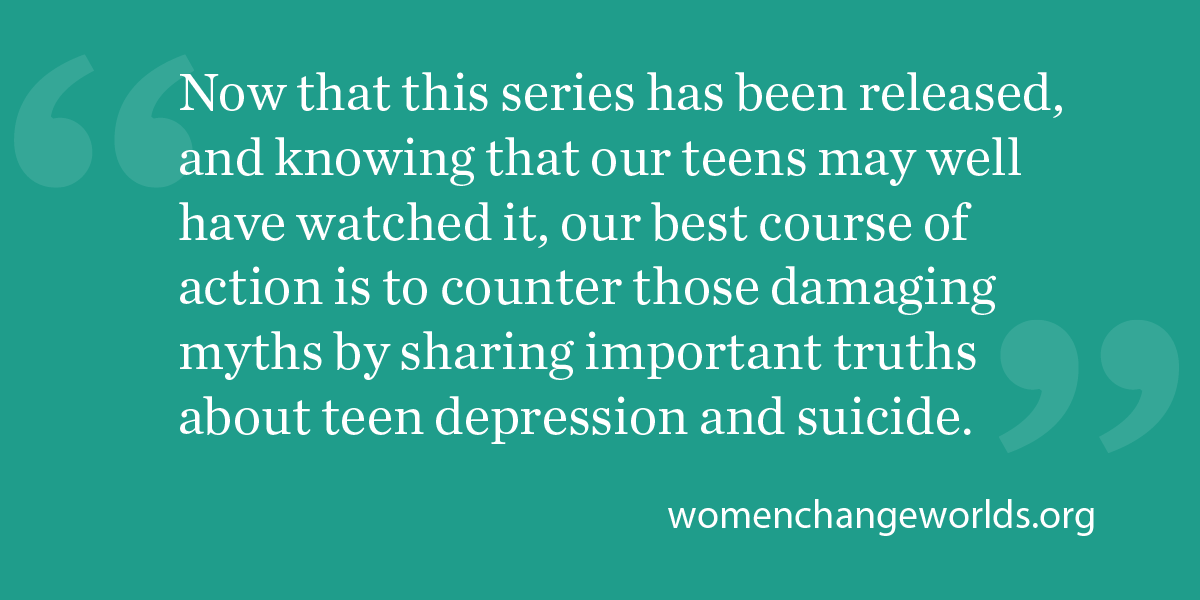 Likewise, we worry about teens that exhibit signs of suicide. Sometimes these signs are subtle, such as giving away prized possessions, withdrawing from friends, or exhibiting significant behavioral changes, such as intense fights with family and friends. Teens thinking about suicide may also provide verbal cues, such as, “I wish I were dead” and “It’s not worth it anymore.” Also, many people who contemplate suicide do so because they believe they are a burden to others, and that they will be doing others a favor if they are no longer here. Thus, if you hear a teen say, “My family would be better off without me,” it is important to take action. Remember that 50-70 percent of people who make a suicide attempt communicate their intent prior to acting, mostly through such actions or verbal cues. Thus, if you recognize any of these signs, it is important to ASK. Although many of us find it scary to ask about suicide, or worry that asking about suicide will give someone the idea to attempt suicide, we know from numerous studies that talking about suicide will not lead to suicidal behavior.
Likewise, we worry about teens that exhibit signs of suicide. Sometimes these signs are subtle, such as giving away prized possessions, withdrawing from friends, or exhibiting significant behavioral changes, such as intense fights with family and friends. Teens thinking about suicide may also provide verbal cues, such as, “I wish I were dead” and “It’s not worth it anymore.” Also, many people who contemplate suicide do so because they believe they are a burden to others, and that they will be doing others a favor if they are no longer here. Thus, if you hear a teen say, “My family would be better off without me,” it is important to take action. Remember that 50-70 percent of people who make a suicide attempt communicate their intent prior to acting, mostly through such actions or verbal cues. Thus, if you recognize any of these signs, it is important to ASK. Although many of us find it scary to ask about suicide, or worry that asking about suicide will give someone the idea to attempt suicide, we know from numerous studies that talking about suicide will not lead to suicidal behavior.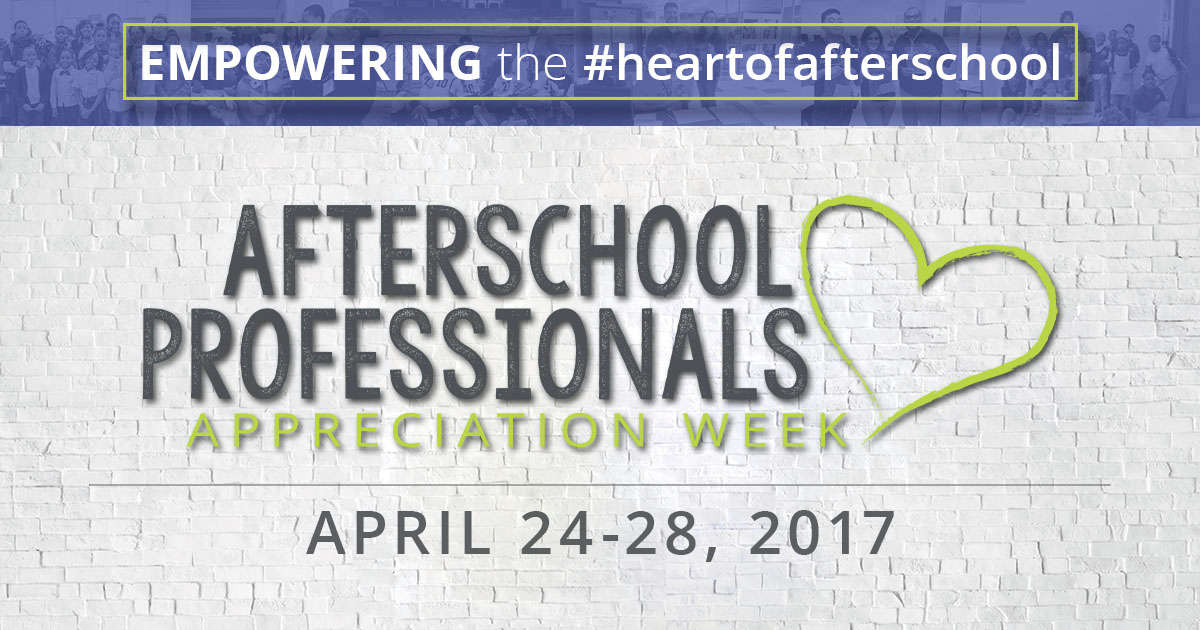 It’s
It’s 
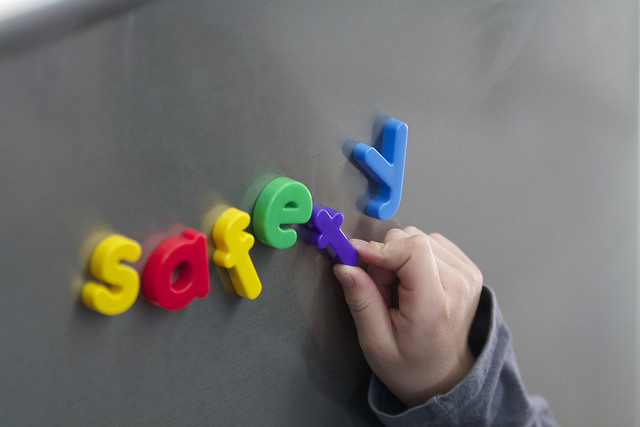 Victims of Domestic Violence Often Face Housing Problems
Victims of Domestic Violence Often Face Housing Problems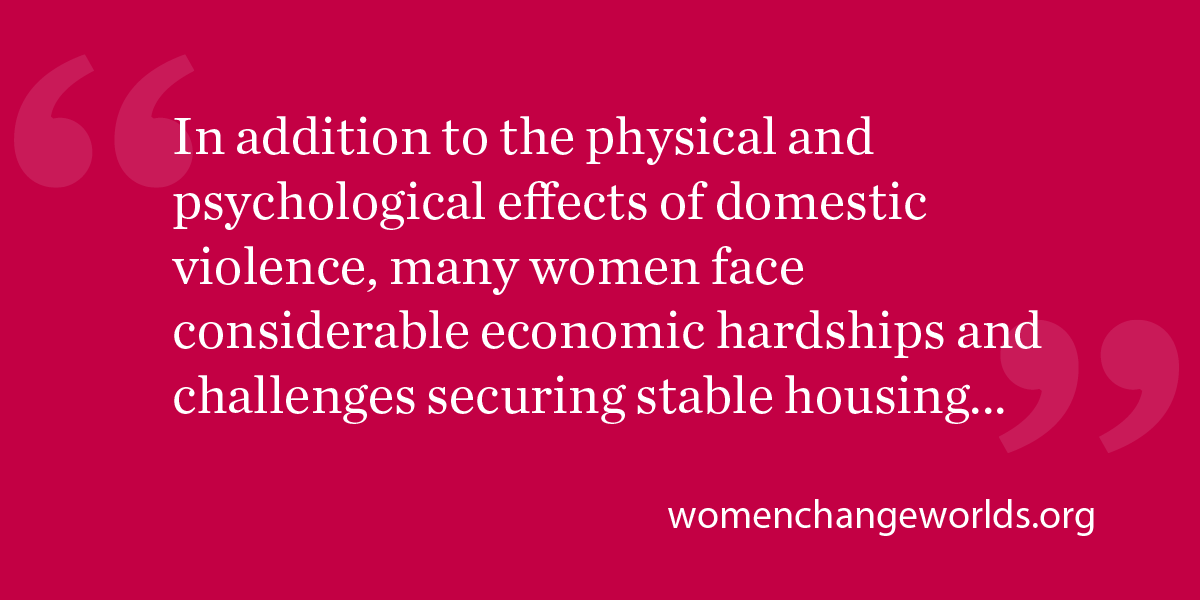
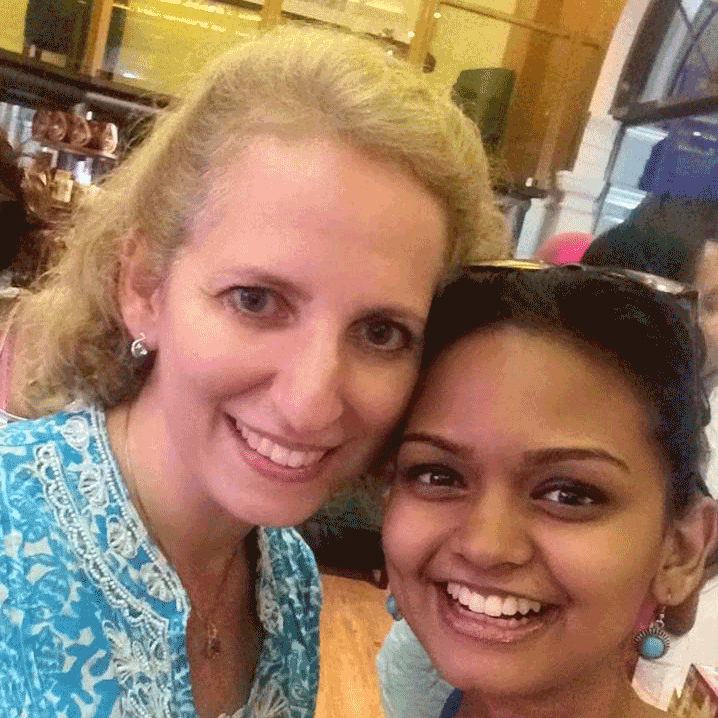 Mentorship was the reason I came to Wellesley College, all the way across the globe from Sri Lanka. Back in 2013 on the day of the United Nations’
Mentorship was the reason I came to Wellesley College, all the way across the globe from Sri Lanka. Back in 2013 on the day of the United Nations’ 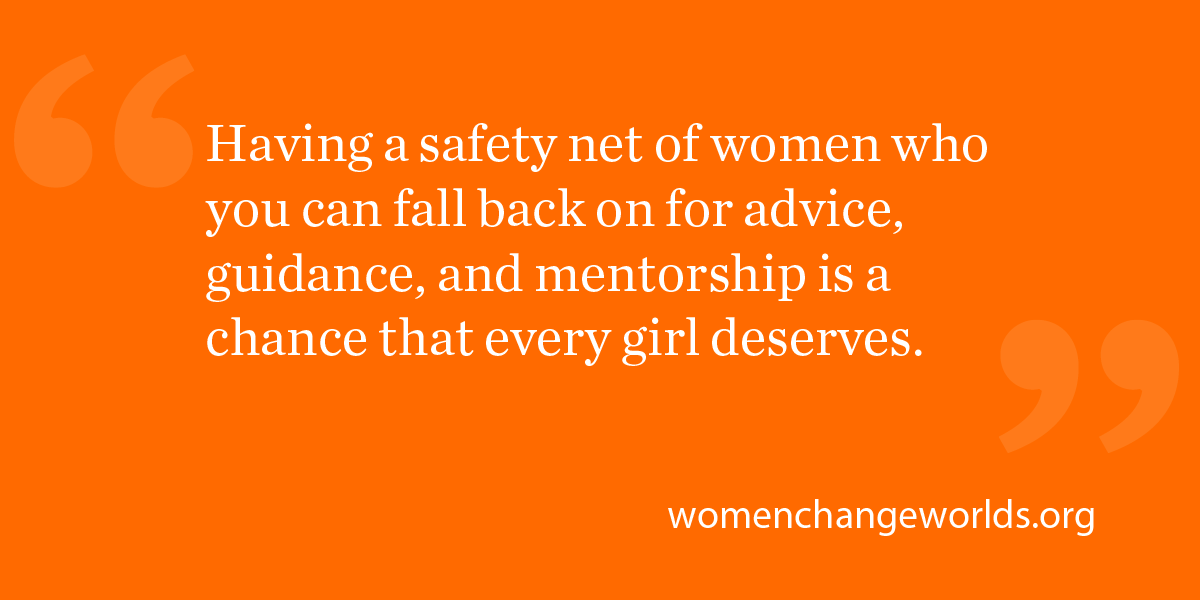
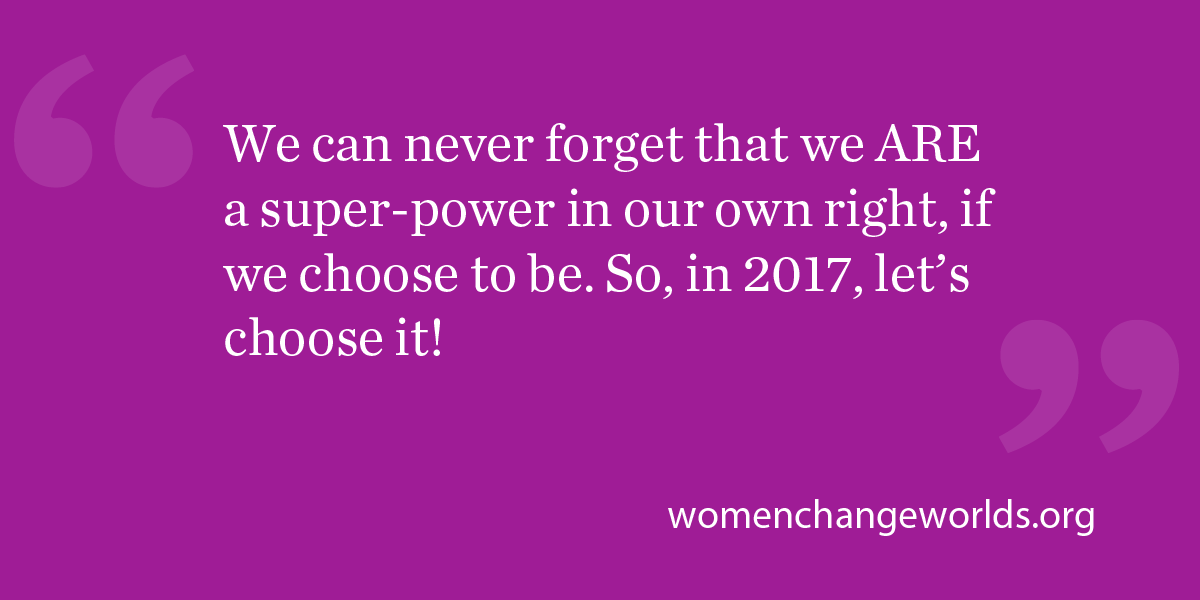
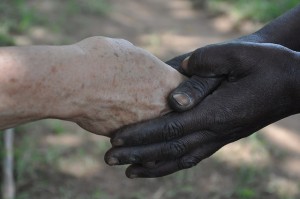

 It’s one thing to teach kids to say “thank you” when they receive a gift or when someone does a favor for them. But how can we help children understand what
It’s one thing to teach kids to say “thank you” when they receive a gift or when someone does a favor for them. But how can we help children understand what 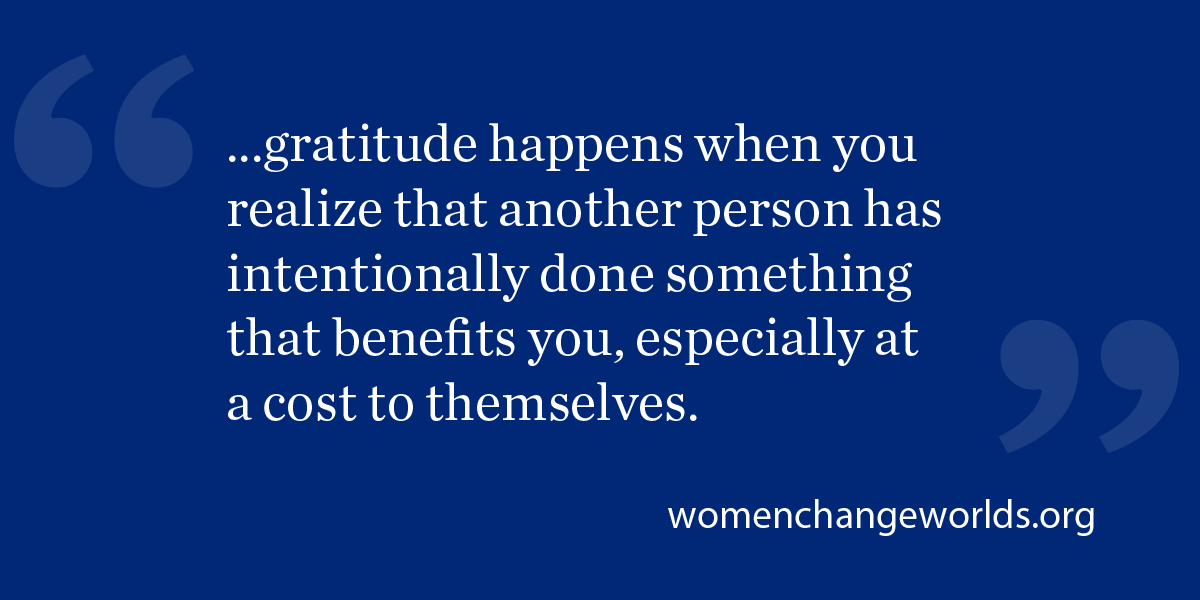 In partnership with the Greater Good Science Center and the John Templeton Foundation,
In partnership with the Greater Good Science Center and the John Templeton Foundation, 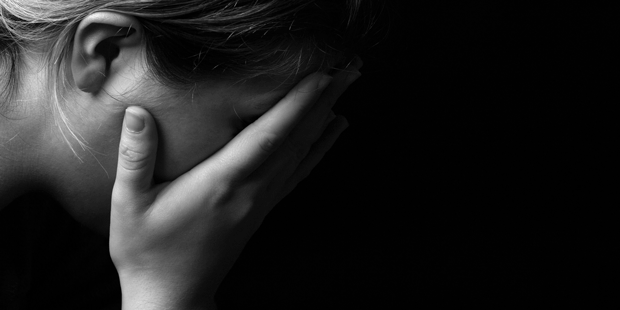 Transitional age youth, those who are leaving state systems of care, are one of our most vulnerable populations of children. Each year in the United States, about 23,000 young people age out of foster care,
Transitional age youth, those who are leaving state systems of care, are one of our most vulnerable populations of children. Each year in the United States, about 23,000 young people age out of foster care, 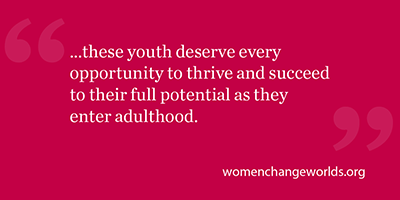
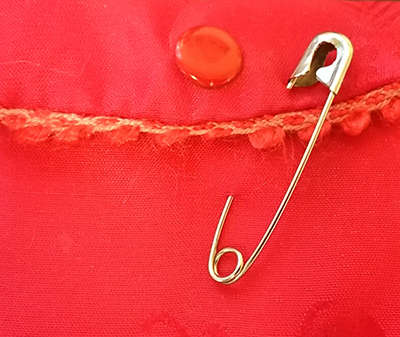 I wrote these thoughts as a white, upper-middle-class, able-bodied, heterosexual, secular humanist woman, with the primary goal of connecting more deeply with other white people and being open to all other intersections. I was deeply impacted by and must honor this writer of color--Isobel Debrujah’s “
I wrote these thoughts as a white, upper-middle-class, able-bodied, heterosexual, secular humanist woman, with the primary goal of connecting more deeply with other white people and being open to all other intersections. I was deeply impacted by and must honor this writer of color--Isobel Debrujah’s “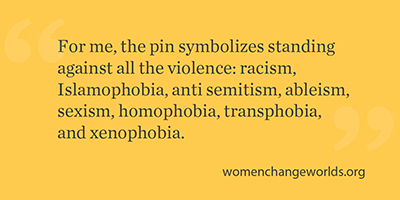 CALLING IN WITH LOVING ACCOUNTABILITY:
CALLING IN WITH LOVING ACCOUNTABILITY: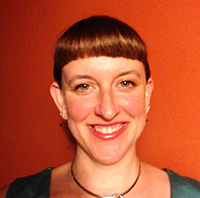 I love the people in my life who push me to be better. I owe much gratitude for this piece to Mirah Anti, Jorge Zeballos, Pat Savage-Williams, Andrea Johnson, Donald Burroughs, Matthew Biecker, Ashley Tuzicka Ray, and Jamie Utt.
I love the people in my life who push me to be better. I owe much gratitude for this piece to Mirah Anti, Jorge Zeballos, Pat Savage-Williams, Andrea Johnson, Donald Burroughs, Matthew Biecker, Ashley Tuzicka Ray, and Jamie Utt.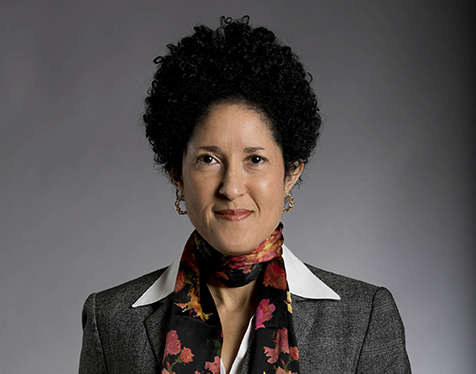
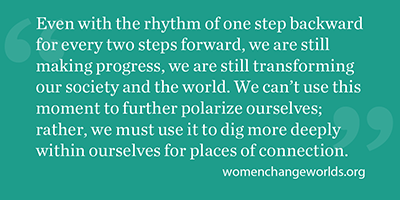 The biggest gift I can offer at this time is empathy – to those whose hopes were shattered, to those whose anger, pain, and frustration led us in this surprising direction, and to those who are just plain terrified right now, especially the little ones and the youth. Clearly, we are a country of different realities, and we need to find common ground. I remind myself of my own mantra, “All of us are sacred.” As Thich Nhat Hanh taught me, I breathe in, breathe out, and utilize the present moment as a place of refuge.
The biggest gift I can offer at this time is empathy – to those whose hopes were shattered, to those whose anger, pain, and frustration led us in this surprising direction, and to those who are just plain terrified right now, especially the little ones and the youth. Clearly, we are a country of different realities, and we need to find common ground. I remind myself of my own mantra, “All of us are sacred.” As Thich Nhat Hanh taught me, I breathe in, breathe out, and utilize the present moment as a place of refuge.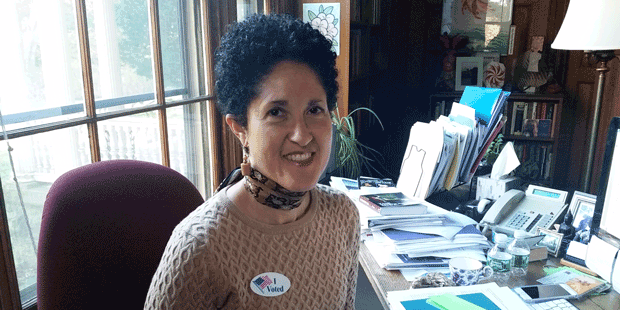 Since voting this morning, all I have been able to think about is the next four years. Without even knowing yet who is going to win, my mind has already jumped ahead. What do we want the next four years to be like? What can we do to make them be the way we want them to be? The negativity of the last 18 months has been excruciating, and I know it doesn’t represent the best of who we are. I want better for all of us!
Since voting this morning, all I have been able to think about is the next four years. Without even knowing yet who is going to win, my mind has already jumped ahead. What do we want the next four years to be like? What can we do to make them be the way we want them to be? The negativity of the last 18 months has been excruciating, and I know it doesn’t represent the best of who we are. I want better for all of us!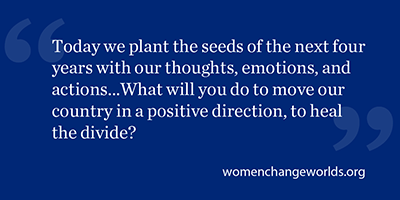 I’m starting with a post-election community unity block party in my neighborhood. I’m inviting the people I see every day – and a few I’ve yet to see, since I’m new to my neighborhood – to my home for an evening of fellowship and food with my family. I’ve let everyone know that it doesn’t matter how you voted, where you worship, whom you love, or where you come from – I just want us to come together in the spirit of friendship and community. My hope is that we will affirm each other as neighbors, discover through conversation the wonders of our diversity, and deepen our sense of connection, concern, and shared destiny. Maybe you can do something like this on the block where you live, too.
I’m starting with a post-election community unity block party in my neighborhood. I’m inviting the people I see every day – and a few I’ve yet to see, since I’m new to my neighborhood – to my home for an evening of fellowship and food with my family. I’ve let everyone know that it doesn’t matter how you voted, where you worship, whom you love, or where you come from – I just want us to come together in the spirit of friendship and community. My hope is that we will affirm each other as neighbors, discover through conversation the wonders of our diversity, and deepen our sense of connection, concern, and shared destiny. Maybe you can do something like this on the block where you live, too. Depression is Prevalent but Prevention Programs Are Limited
Depression is Prevalent but Prevention Programs Are Limited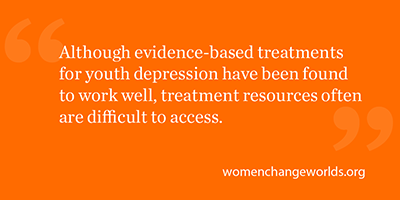 Approaches & Recommendations
Approaches & Recommendations
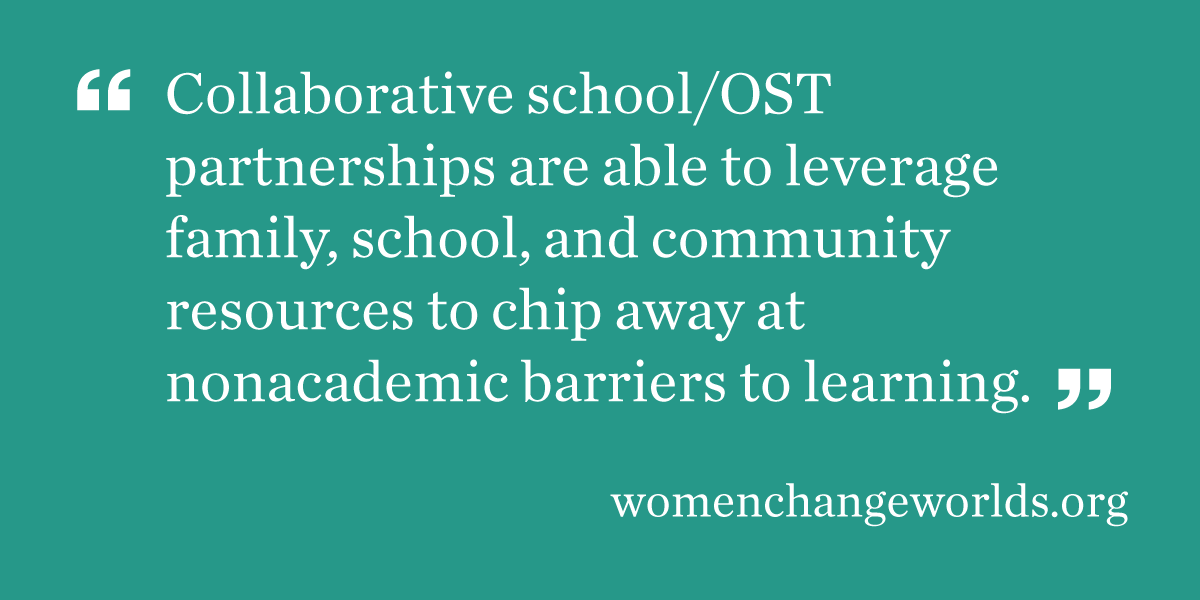 Boston After School & Beyond (BASB)
Boston After School & Beyond (BASB)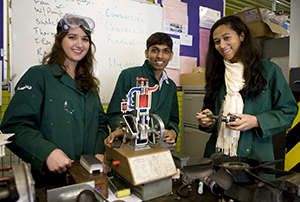
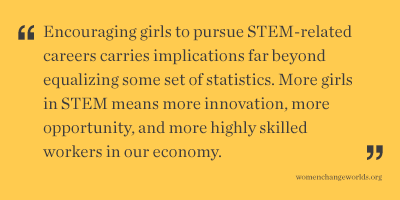 National nonprofit organizations like
National nonprofit organizations like 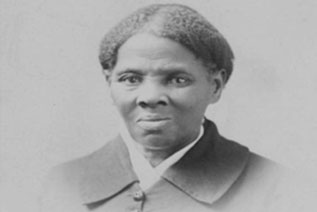
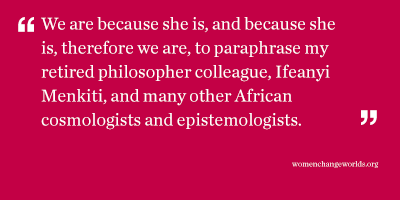 When the U.S. Department of the Treasury announced two years ago that it was planning to put a woman on the $10 bill, I voted for Harriet Tubman every chance I got. I was privileged to participate in an invitation-only phone call of women leaders with representatives from the Treasury Department, and I also voted online as an “ordinary citizen.” And I unapologetically urged my friends on social media to do the same. So, when the
When the U.S. Department of the Treasury announced two years ago that it was planning to put a woman on the $10 bill, I voted for Harriet Tubman every chance I got. I was privileged to participate in an invitation-only phone call of women leaders with representatives from the Treasury Department, and I also voted online as an “ordinary citizen.” And I unapologetically urged my friends on social media to do the same. So, when the 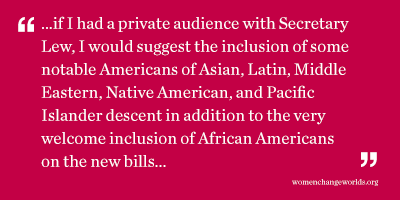 Admittedly, if I had a private audience with Secretary Lew, I would suggest the inclusion of some notable Americans of Asian, Latin, Middle Eastern, Native American, and Pacific Islander descent in addition to the very welcome inclusion of African Americans on the new bills--and I might even suggest that he replace the image of slaveholder President Andrew Jackson (after whom my hometown, Jacksonville, Florida, is named, incidentally) with these diverse Americans, since he has (too) long had his day in the sun. I can only hope that this is the plan for the $50 and $100 bills!
Admittedly, if I had a private audience with Secretary Lew, I would suggest the inclusion of some notable Americans of Asian, Latin, Middle Eastern, Native American, and Pacific Islander descent in addition to the very welcome inclusion of African Americans on the new bills--and I might even suggest that he replace the image of slaveholder President Andrew Jackson (after whom my hometown, Jacksonville, Florida, is named, incidentally) with these diverse Americans, since he has (too) long had his day in the sun. I can only hope that this is the plan for the $50 and $100 bills!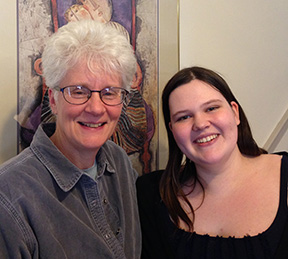
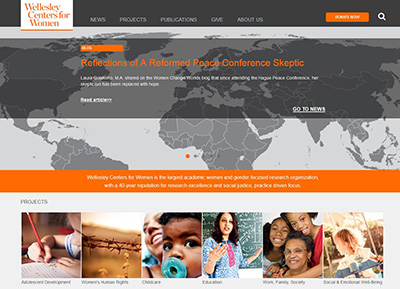
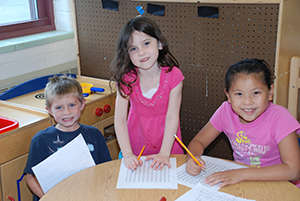
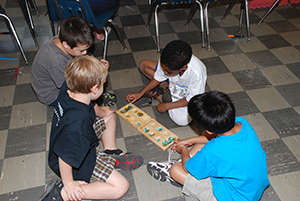

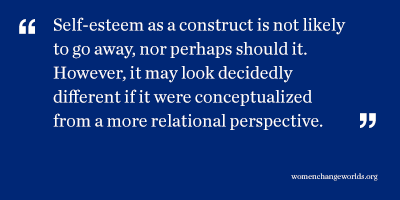 I could not help but be reminded of something that my grandmother Donnie would say to young people in our family. If anyone one of us dared to violate her standards of good grooming or “respectable” behavior, she would say: “Don’t go out acting like you don’t have people.” At the time, her counsel was little more than an irritation. “Having people” could mean anything from representing your family by working hard in school to properly ironing a ruffled blouse. It’s a safe bet that my grandmother never heard of Maslow, and I’m guessing she lived the better part of eight decades without ever using the words “self-esteem.” She did, however, know a lot about respect, reverence, and dignity. What we now call self-esteem is what my grandmother expressed as self and other--awareness. Her version of self-esteem was awareness of connection to community. Further, it meant appreciation for the care that community bestows, and an obligation to represent that care in the world and to the world. Put plainly the lesson was this: how you go out into the world is not just your private business; your behavior reflects on and has consequences for the communities from which you come.
I could not help but be reminded of something that my grandmother Donnie would say to young people in our family. If anyone one of us dared to violate her standards of good grooming or “respectable” behavior, she would say: “Don’t go out acting like you don’t have people.” At the time, her counsel was little more than an irritation. “Having people” could mean anything from representing your family by working hard in school to properly ironing a ruffled blouse. It’s a safe bet that my grandmother never heard of Maslow, and I’m guessing she lived the better part of eight decades without ever using the words “self-esteem.” She did, however, know a lot about respect, reverence, and dignity. What we now call self-esteem is what my grandmother expressed as self and other--awareness. Her version of self-esteem was awareness of connection to community. Further, it meant appreciation for the care that community bestows, and an obligation to represent that care in the world and to the world. Put plainly the lesson was this: how you go out into the world is not just your private business; your behavior reflects on and has consequences for the communities from which you come.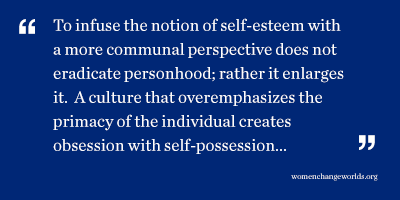 One of the foundational tenets of Relational-Cultural Theory is that the purpose of being in relationship. Having a sense of agency then is to claim our responsibility as co-creators of human possibility. I can think of a no more telling example of this perspective than a conversation I had with a young Indonesian man a few years ago. He told me that as a member of a religious minority in his country, he knew that he had to work twice as hard to get half as far: precisely the advice that I had heard growing up in a racially stratified culture decades earlier. Interestingly, this belief did not engender defeatism or victimhood. Rather, it confirmed the obligation to community: to advance the contributions of preceding generations and to provide “uplift” for future generations. Further, it instilled confidence in our ability and obligation to make the world a little bit better for others.
One of the foundational tenets of Relational-Cultural Theory is that the purpose of being in relationship. Having a sense of agency then is to claim our responsibility as co-creators of human possibility. I can think of a no more telling example of this perspective than a conversation I had with a young Indonesian man a few years ago. He told me that as a member of a religious minority in his country, he knew that he had to work twice as hard to get half as far: precisely the advice that I had heard growing up in a racially stratified culture decades earlier. Interestingly, this belief did not engender defeatism or victimhood. Rather, it confirmed the obligation to community: to advance the contributions of preceding generations and to provide “uplift” for future generations. Further, it instilled confidence in our ability and obligation to make the world a little bit better for others.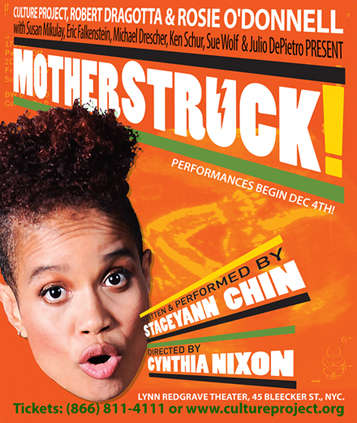
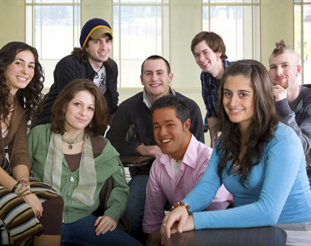
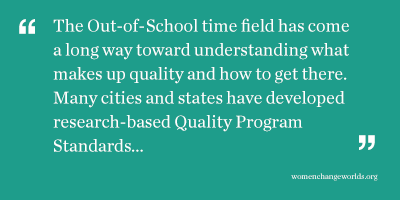 So, how do we promote and ensure quality? One major key is staff training and professional development. Since NIOST’s early role in the
So, how do we promote and ensure quality? One major key is staff training and professional development. Since NIOST’s early role in the 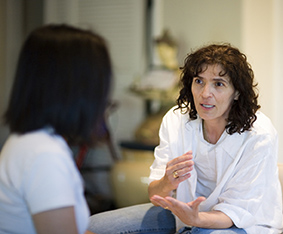
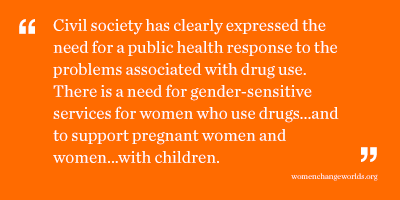 form of justice-involvement (mostly probation). However, comparisons between justice-involved and non-justice-involved women revealed few differences on demographic and other characteristics. For example, their ages, maternal status, the number of children they have, their children’s ages, and the percentage living with their children.
form of justice-involvement (mostly probation). However, comparisons between justice-involved and non-justice-involved women revealed few differences on demographic and other characteristics. For example, their ages, maternal status, the number of children they have, their children’s ages, and the percentage living with their children.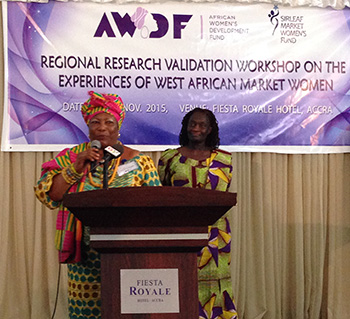
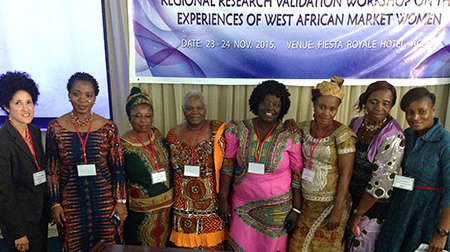
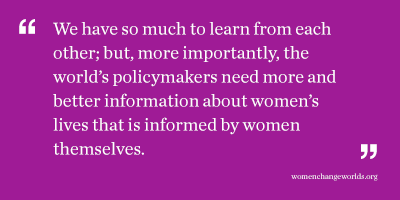 market women organizations, with a special focus on gender parity in leadership. Although women are, by far, the largest proportion of marketers and traders, often it is the few men who are afforded positions of leadership that allow them to engage with policymakers. The market women who participated in our study would like to see women’s voices rise to the top and for women’s leadership to be recognized with top-level posts. Additionally, they indicated that the time might be right for a West Africa-wide market women’s organization that allowed market women from different countries to network, share best practices, and shape policy that affects them. Many touted the Sirleaf Market Women’s Fund as a good example of a multi-constituency organization that has raised the visibility of market women’s issues at the same time as it has brought different stakeholders together for a common cause, and they imagined this model growing from its roots in Liberia to other countries. Additionally, the pivotal roles of the African Women’s Development Fund, UN Women, and Ford, all of which have provided funding for market women’s issues and related actions, were lauded as model donors.
market women organizations, with a special focus on gender parity in leadership. Although women are, by far, the largest proportion of marketers and traders, often it is the few men who are afforded positions of leadership that allow them to engage with policymakers. The market women who participated in our study would like to see women’s voices rise to the top and for women’s leadership to be recognized with top-level posts. Additionally, they indicated that the time might be right for a West Africa-wide market women’s organization that allowed market women from different countries to network, share best practices, and shape policy that affects them. Many touted the Sirleaf Market Women’s Fund as a good example of a multi-constituency organization that has raised the visibility of market women’s issues at the same time as it has brought different stakeholders together for a common cause, and they imagined this model growing from its roots in Liberia to other countries. Additionally, the pivotal roles of the African Women’s Development Fund, UN Women, and Ford, all of which have provided funding for market women’s issues and related actions, were lauded as model donors.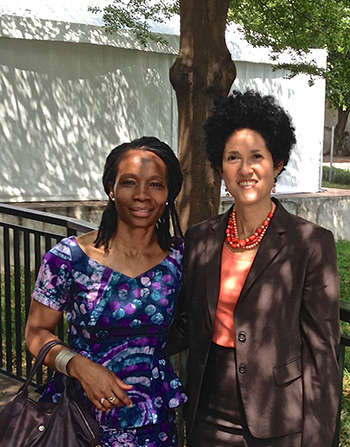

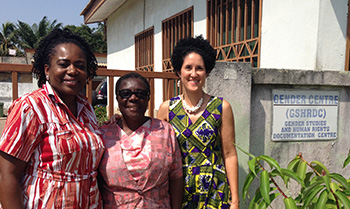
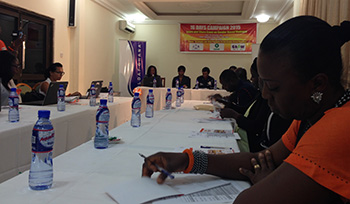
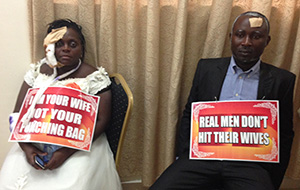 One conundrum that was discussed is the fact gender-based violence statistics have gone up in recent years in Ghana, begging the question of whether domestic violence really is on the rise or, alternately, whether the new law has merely increased reporting of incidents due to society-wide sensitization. Although both factors may be at play, there was general agreement that the law was a necessary intervention on an unacceptable situation--broad scale gender-based violence in Ghana. (Of course, lest anyone single Ghana out, the
One conundrum that was discussed is the fact gender-based violence statistics have gone up in recent years in Ghana, begging the question of whether domestic violence really is on the rise or, alternately, whether the new law has merely increased reporting of incidents due to society-wide sensitization. Although both factors may be at play, there was general agreement that the law was a necessary intervention on an unacceptable situation--broad scale gender-based violence in Ghana. (Of course, lest anyone single Ghana out, the 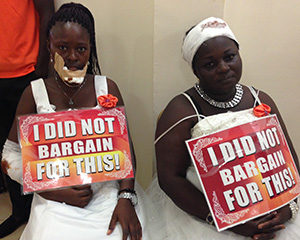
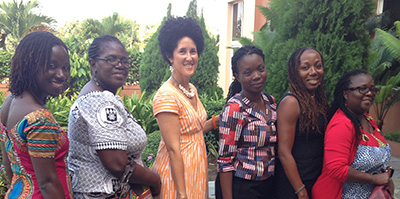
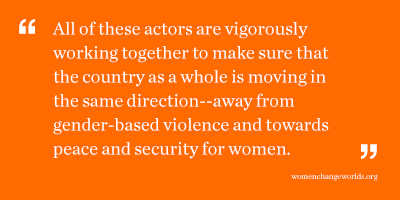 data, convened a group of stakeholders to write new policy, and shepherded the draft policy through the national legislative process while simultaneously engaging in public education so that the government and the people were in it together. They needed to piece together support from many sources over many years to make this happen. Many others who also cared passionately about ending gender-based violence worked with them or supported this work. Now, as Ghana looks ahead the tenth anniversary of its landmark domestic violence legislation, the country can claim many accomplishments. These include the expansion of its judiciary system to address gender-based violence, a sensitized police force that includes a domestic violence unit, and the leadership of its Ministry of Gender, Children, and Social Protection. It also includes increased awareness of groups with special vulnerabilities (such as people with disabilities), and the education and sensitization efforts of numerous NGOs like WiLDAF and academic institutes like CEGENSA. All of these actors are vigorously working together to make sure that the country as a whole is moving in the same direction--away from gender-based violence and towards peace and security for women. Other countries can learn from Ghana --and other countries can increase the link between research and action to end gender-based violence.
data, convened a group of stakeholders to write new policy, and shepherded the draft policy through the national legislative process while simultaneously engaging in public education so that the government and the people were in it together. They needed to piece together support from many sources over many years to make this happen. Many others who also cared passionately about ending gender-based violence worked with them or supported this work. Now, as Ghana looks ahead the tenth anniversary of its landmark domestic violence legislation, the country can claim many accomplishments. These include the expansion of its judiciary system to address gender-based violence, a sensitized police force that includes a domestic violence unit, and the leadership of its Ministry of Gender, Children, and Social Protection. It also includes increased awareness of groups with special vulnerabilities (such as people with disabilities), and the education and sensitization efforts of numerous NGOs like WiLDAF and academic institutes like CEGENSA. All of these actors are vigorously working together to make sure that the country as a whole is moving in the same direction--away from gender-based violence and towards peace and security for women. Other countries can learn from Ghana --and other countries can increase the link between research and action to end gender-based violence.